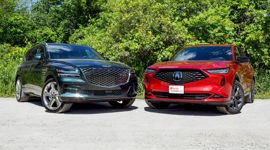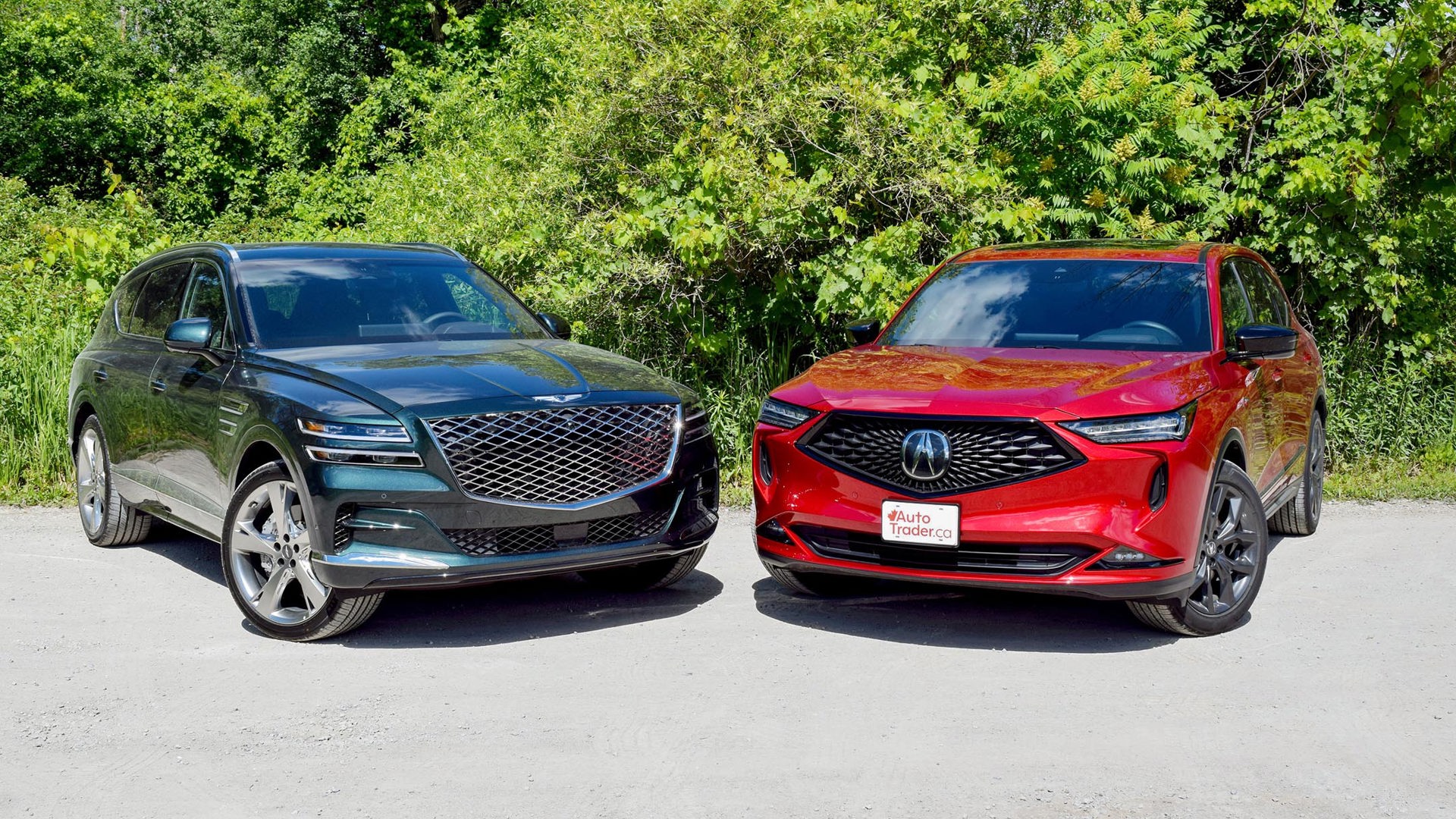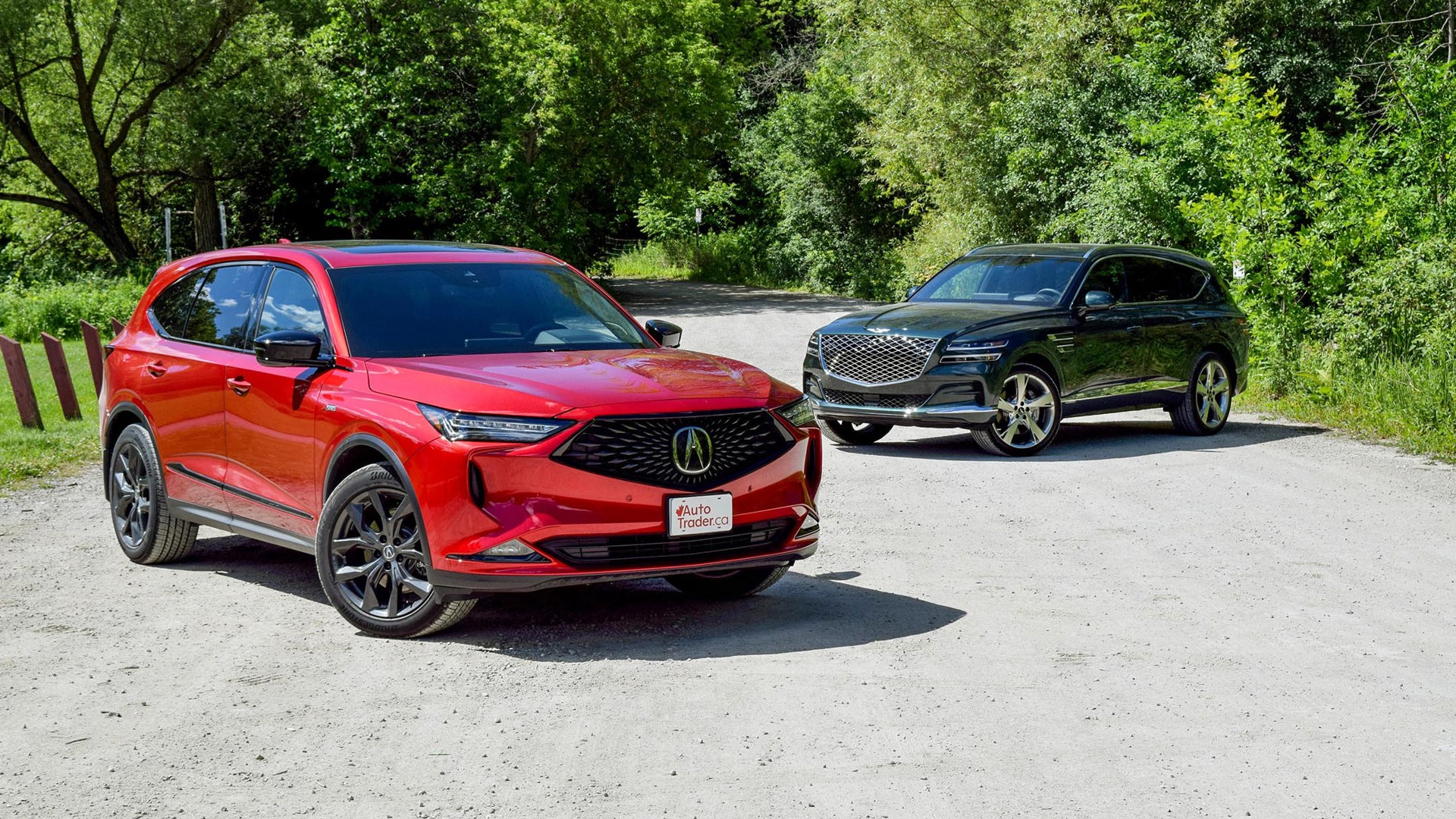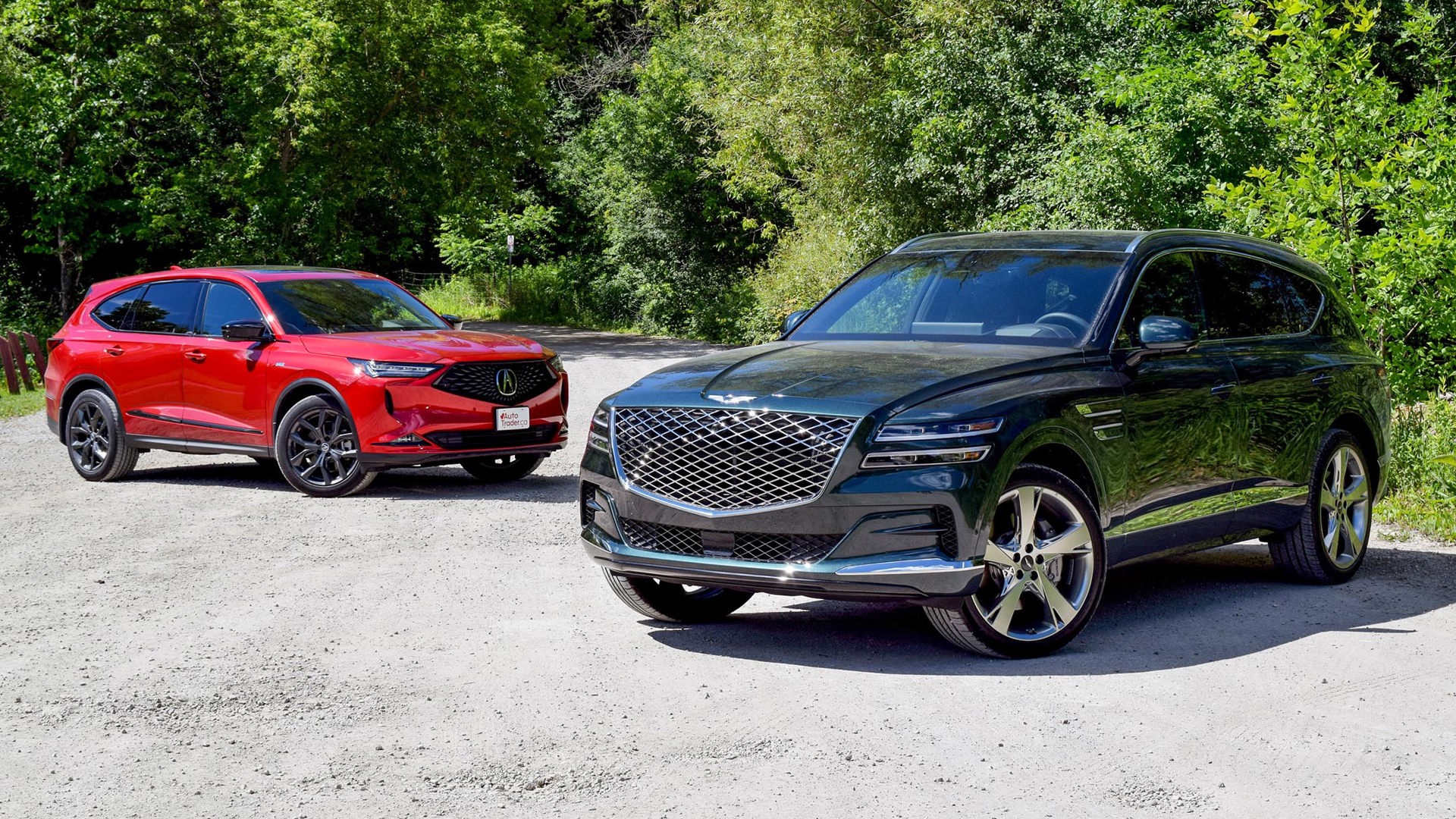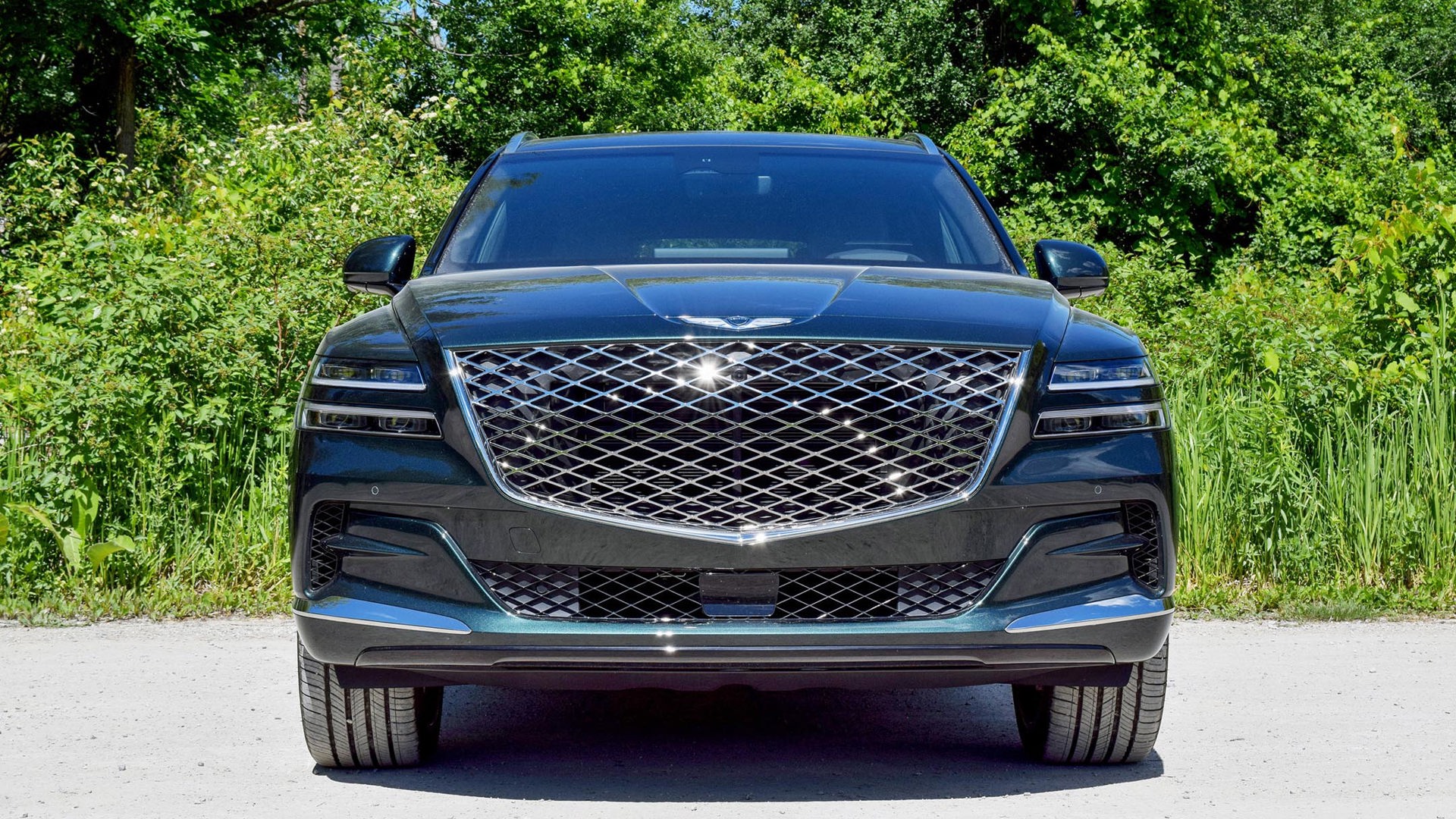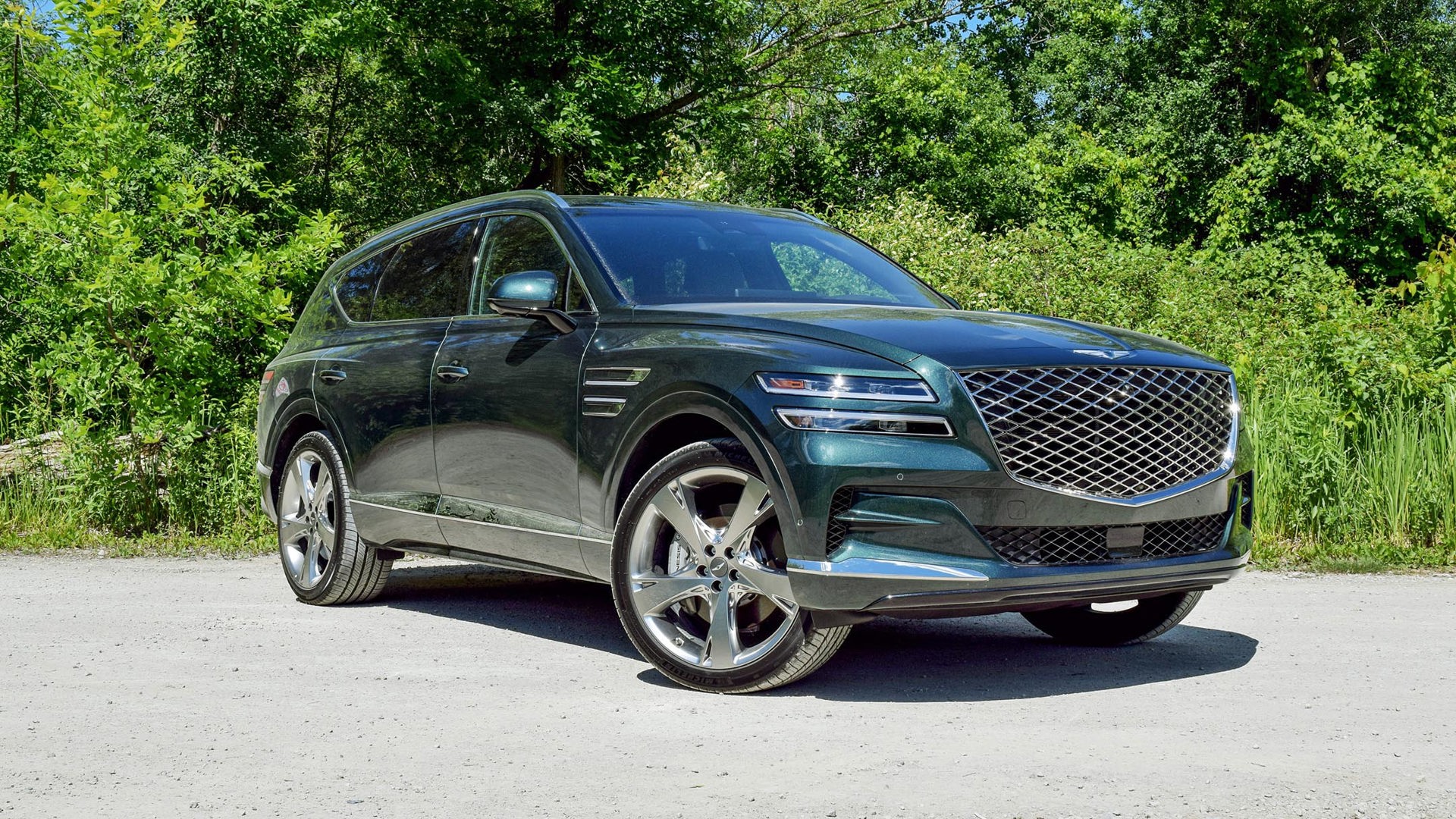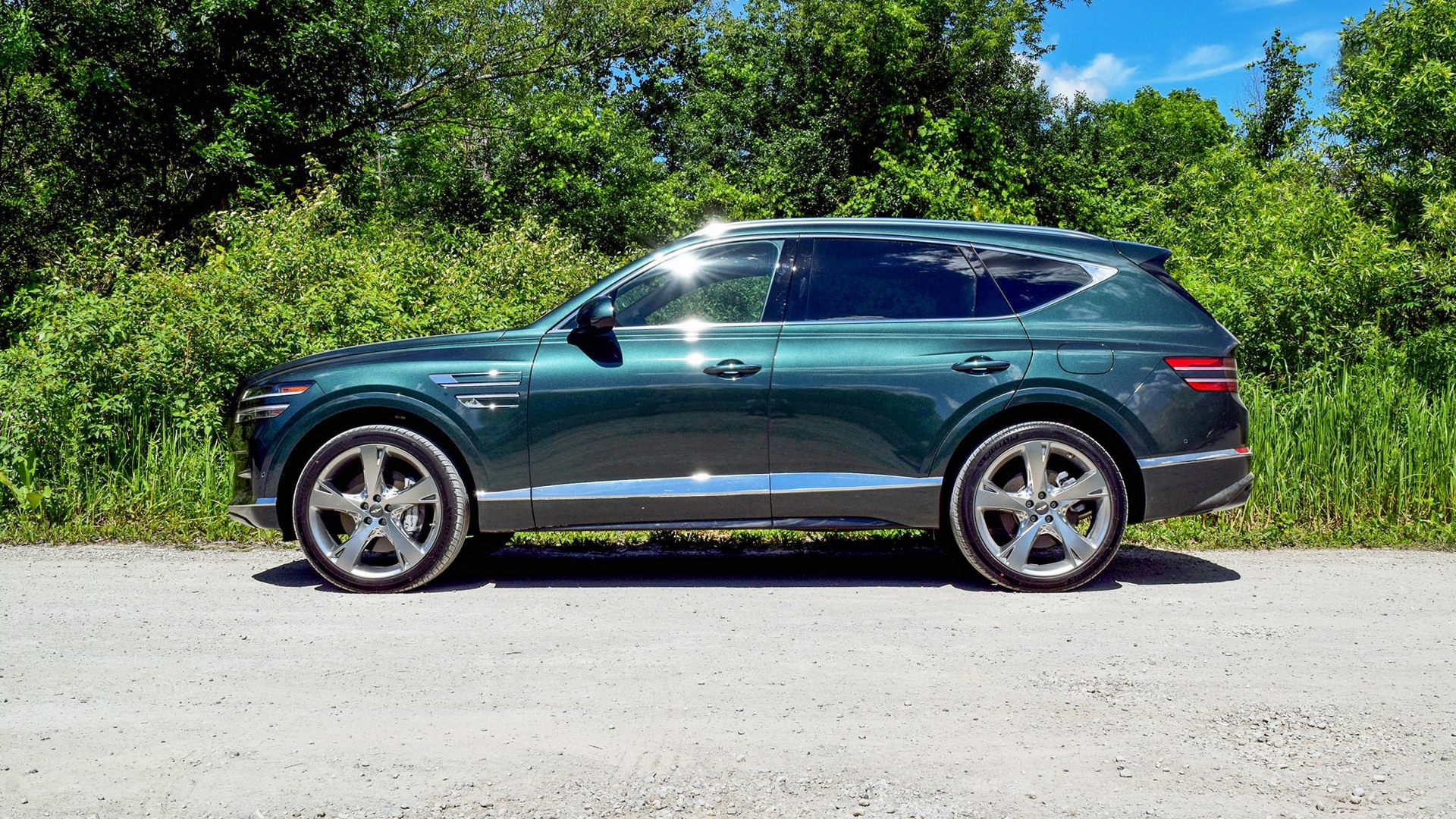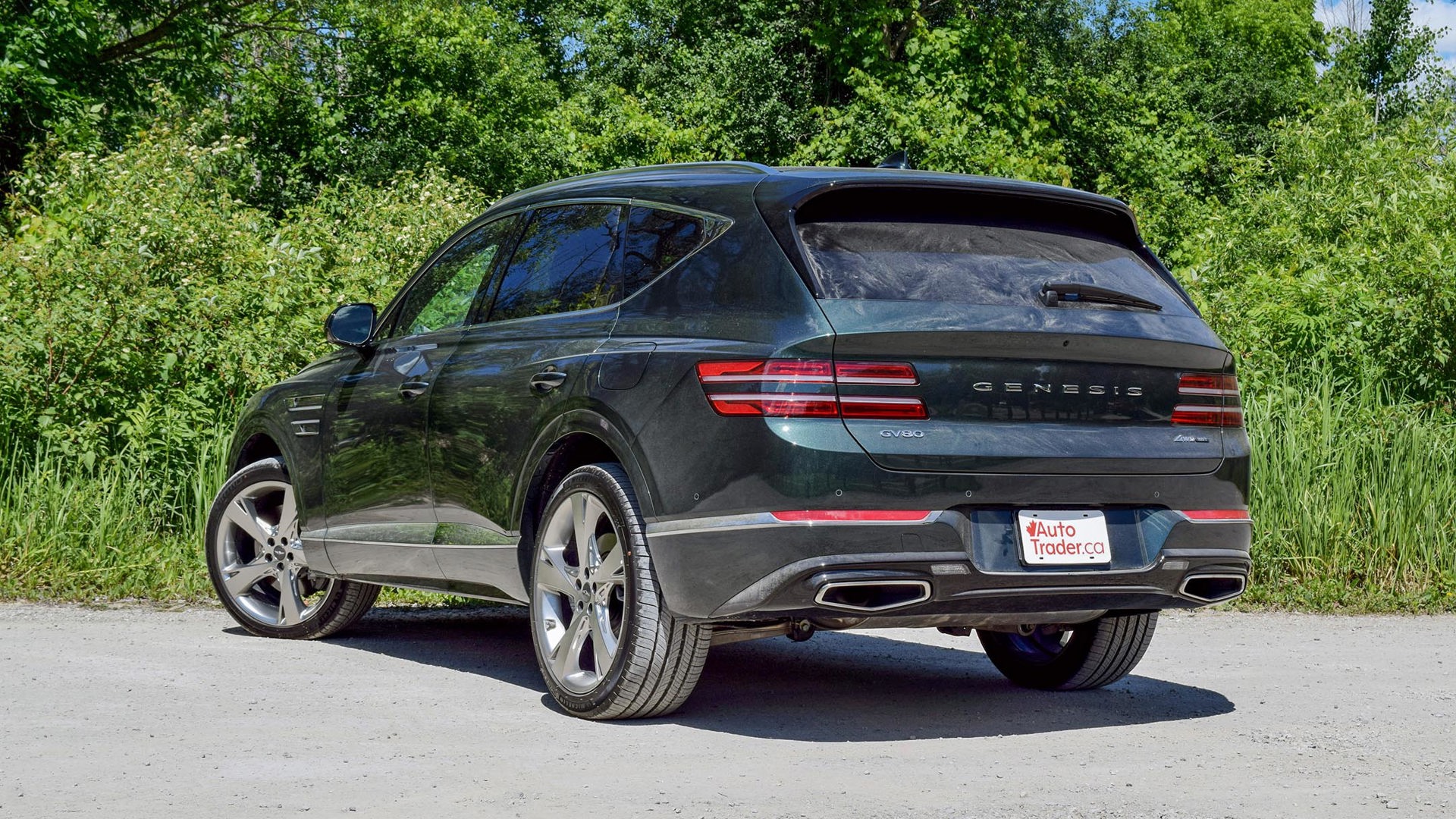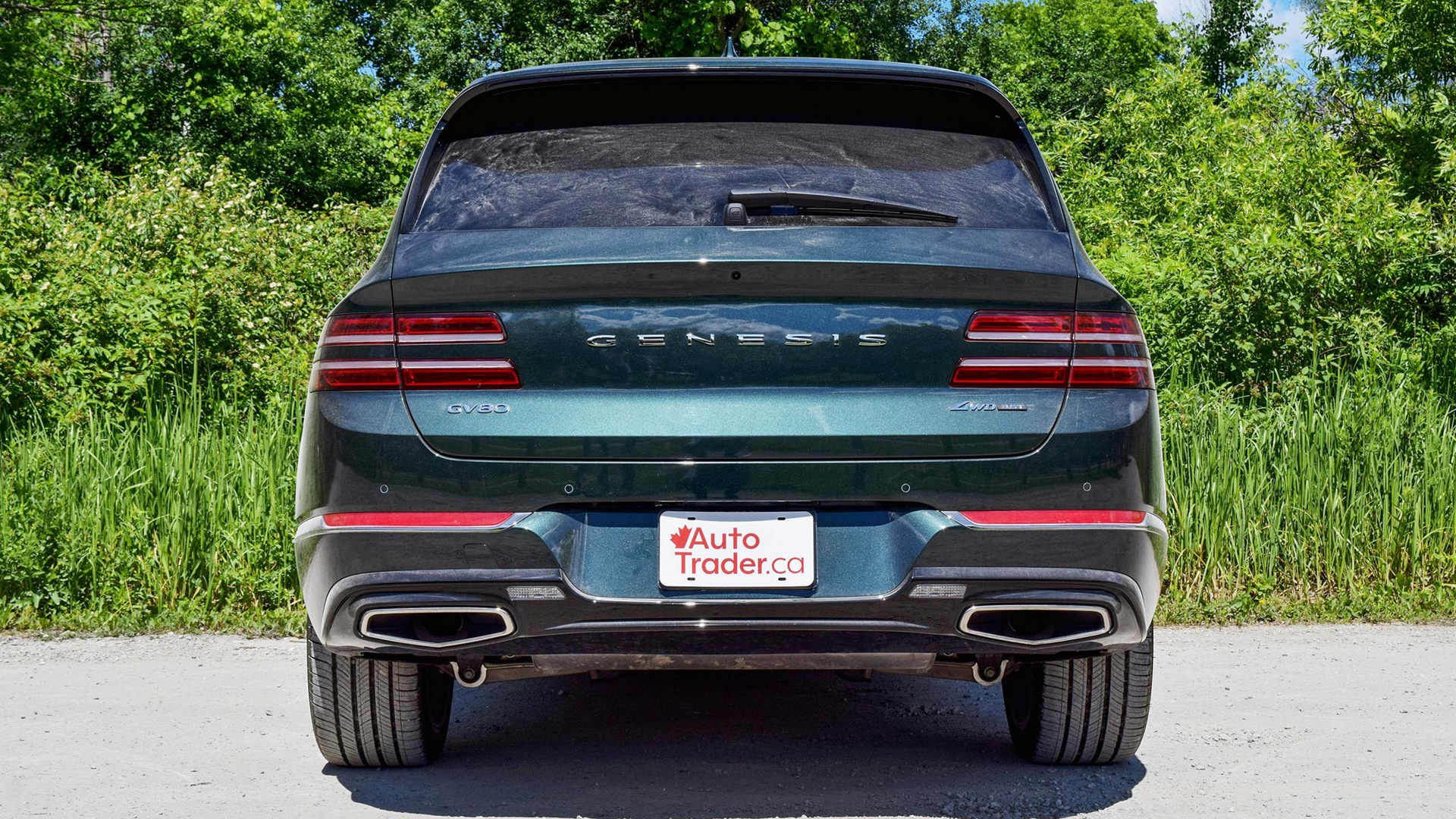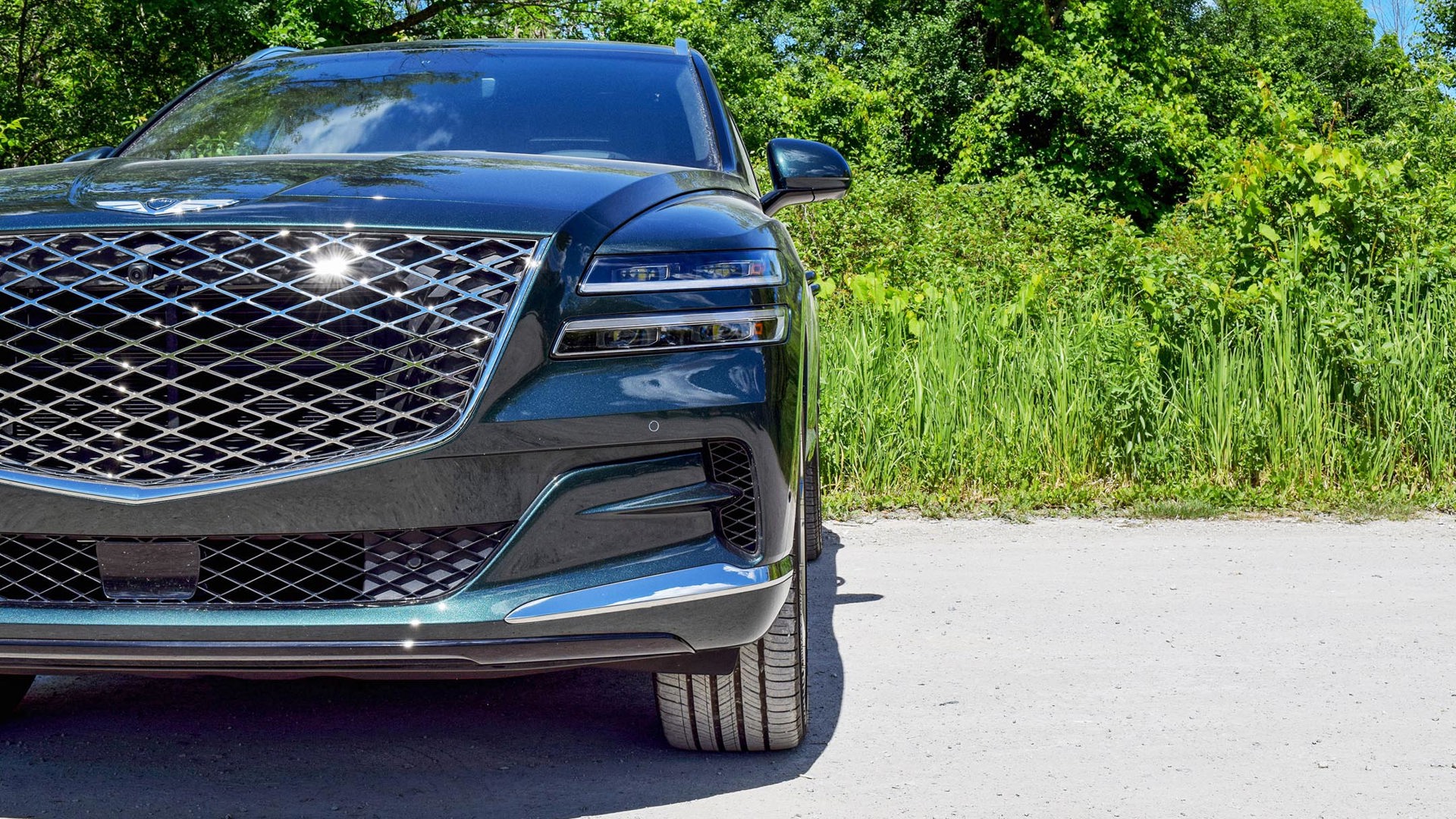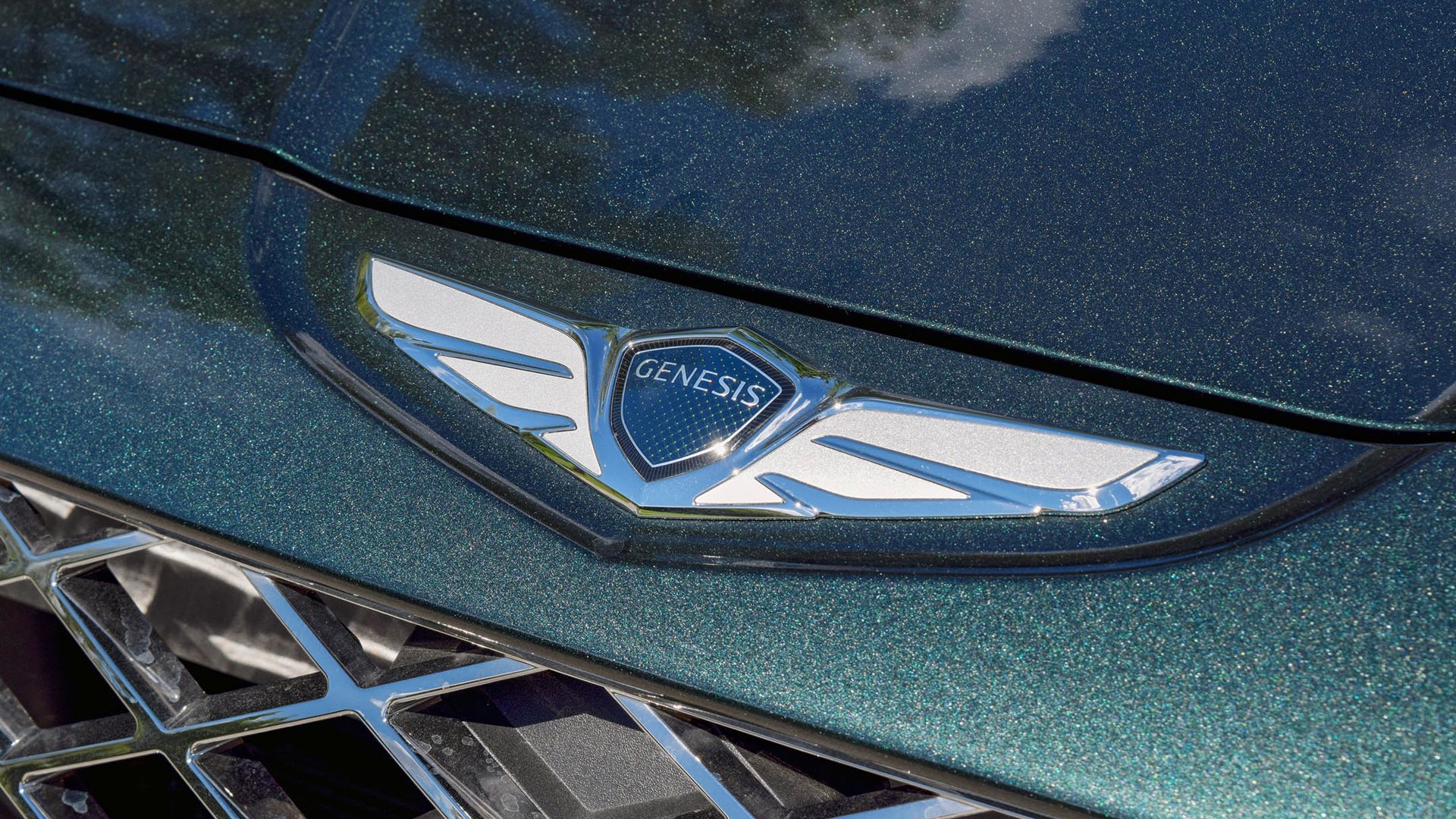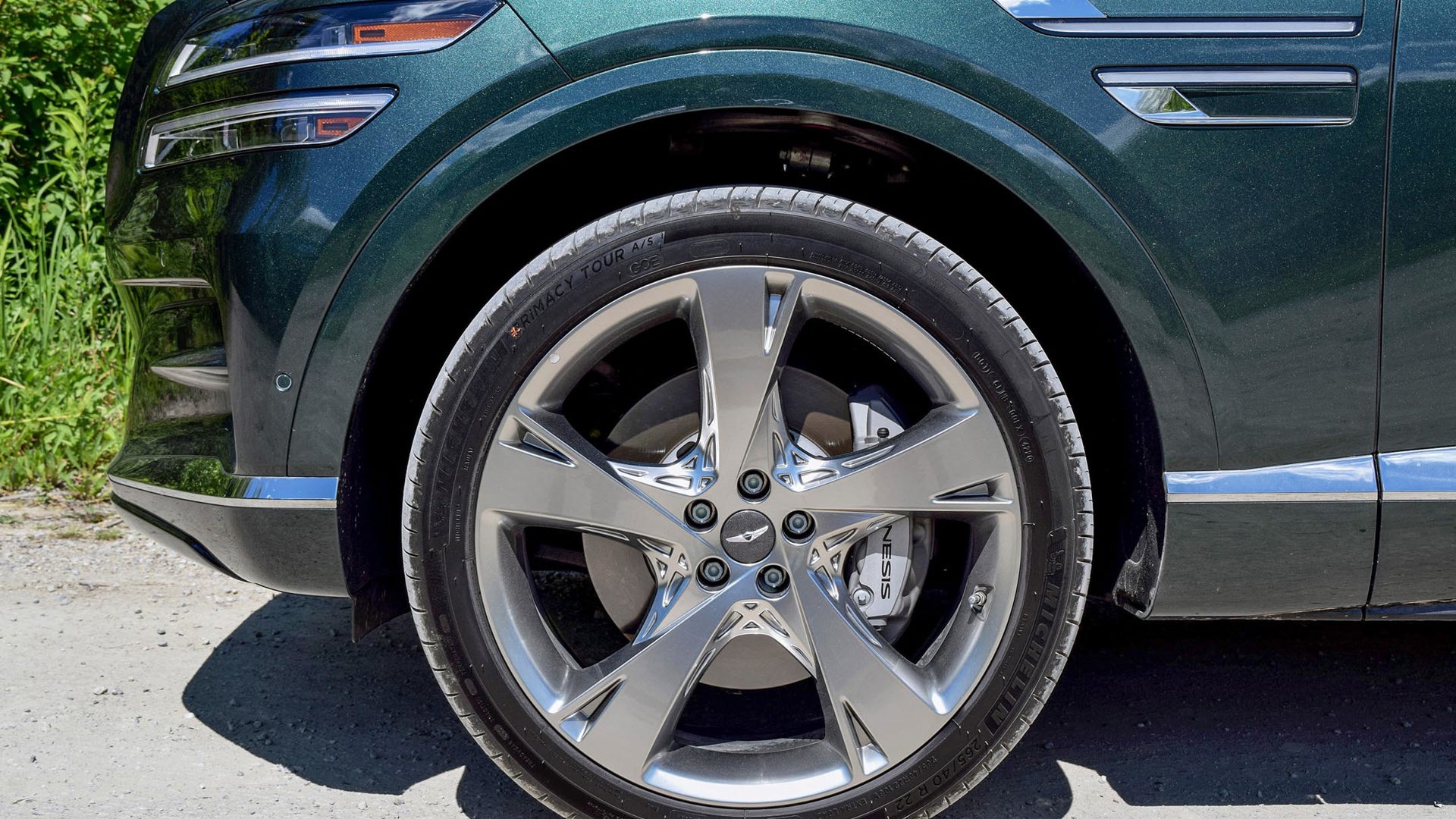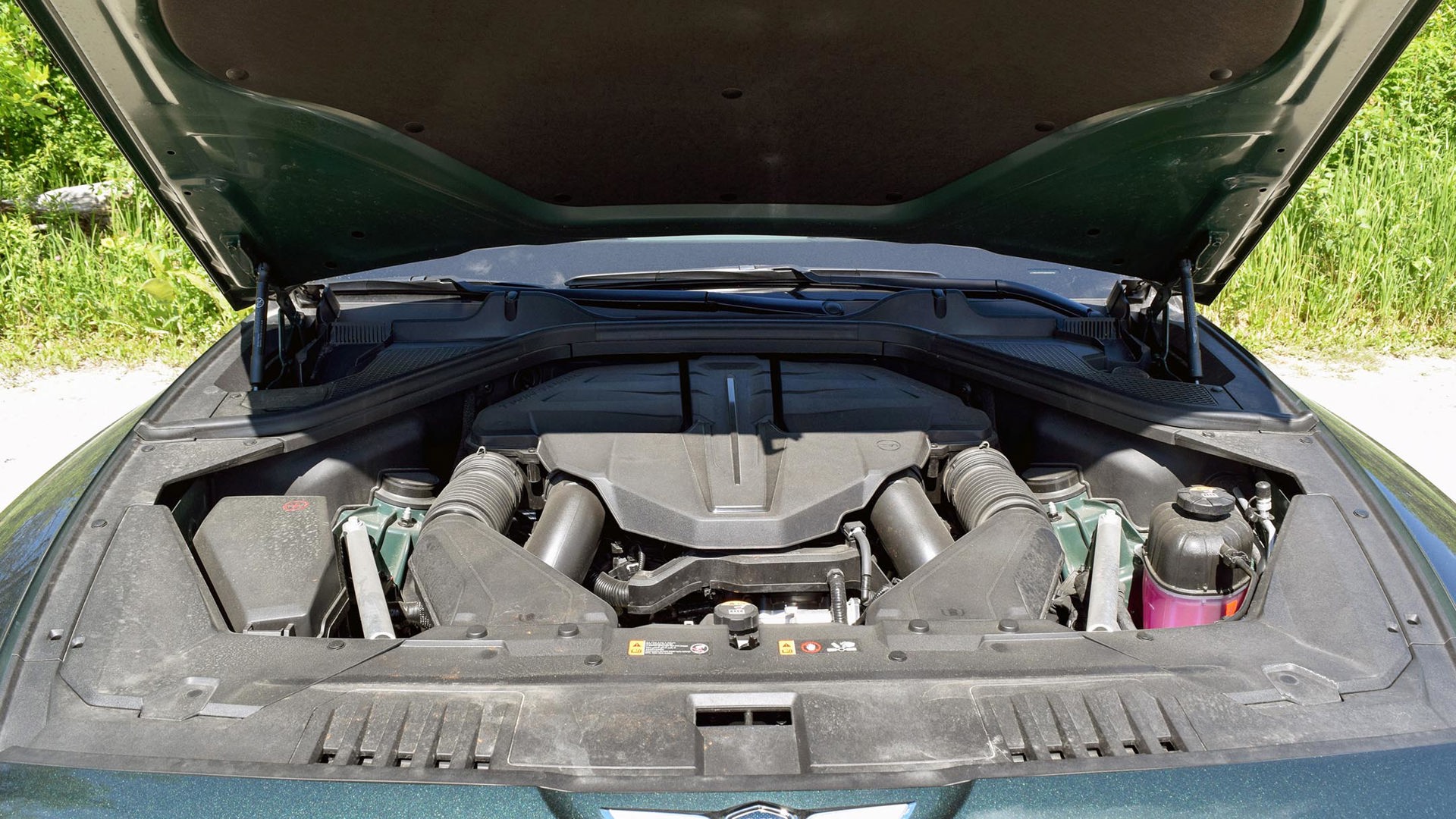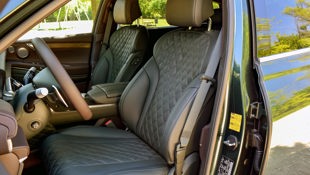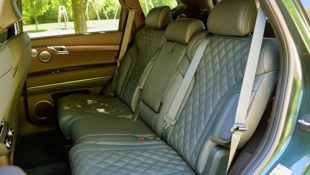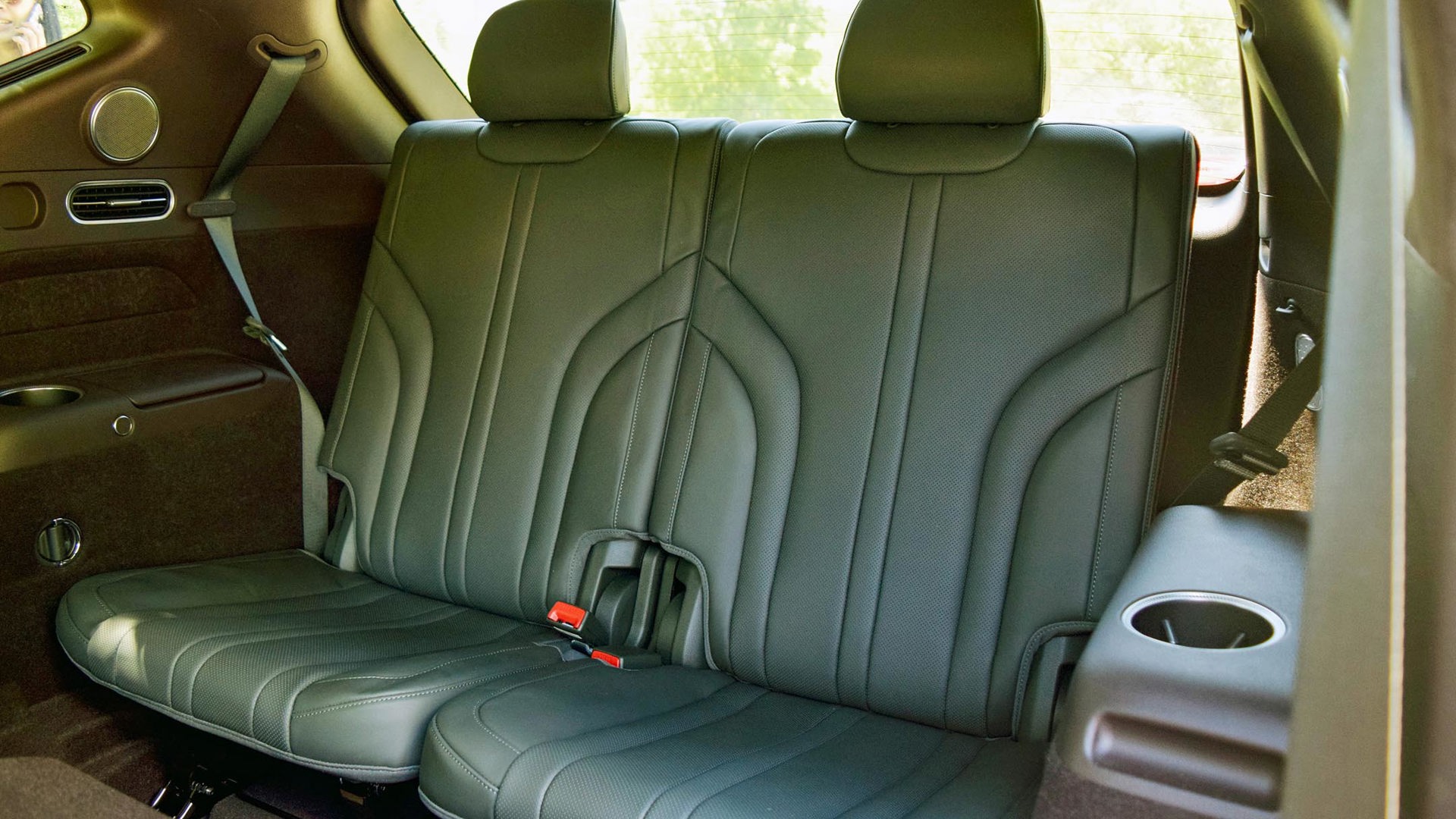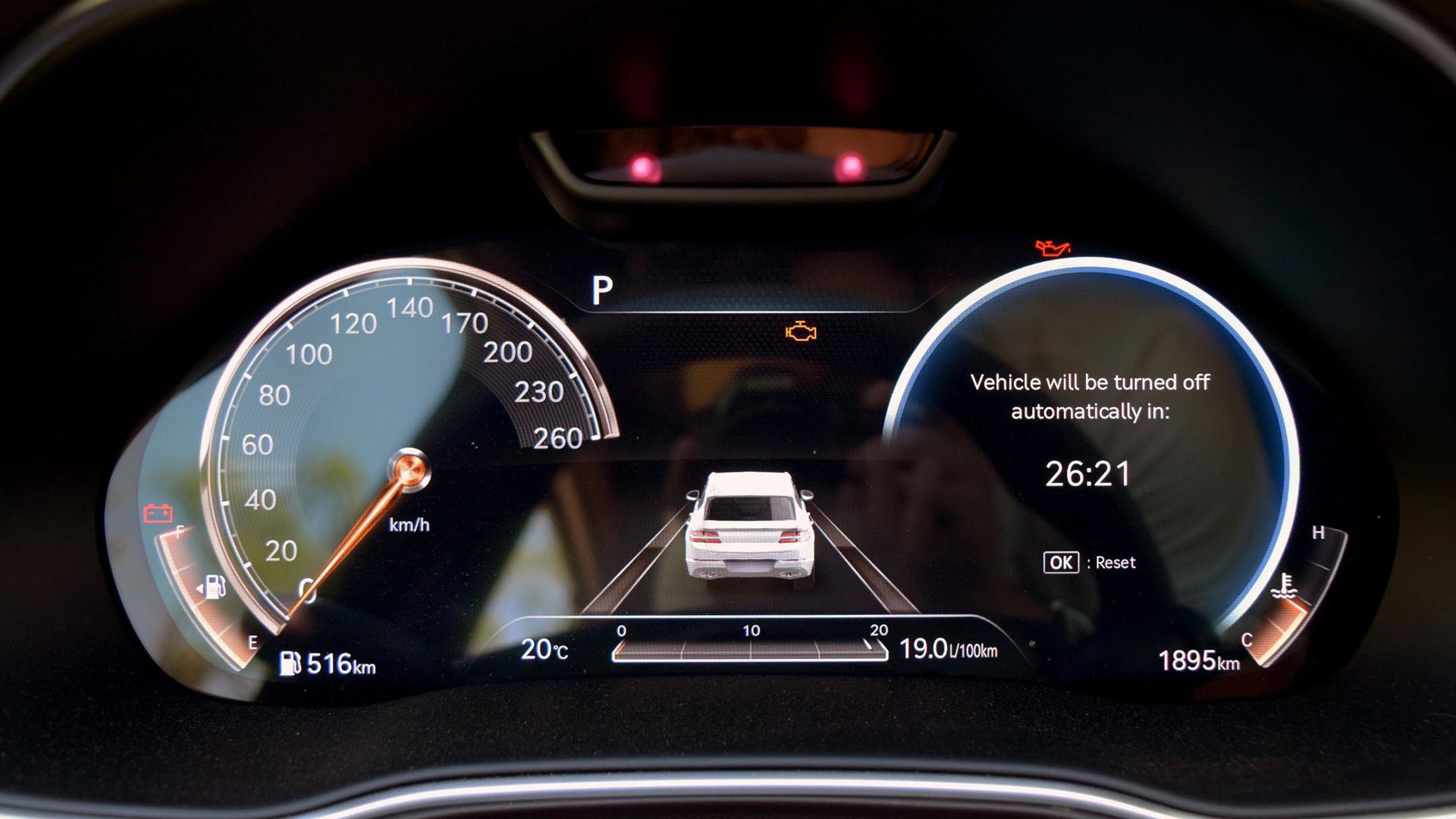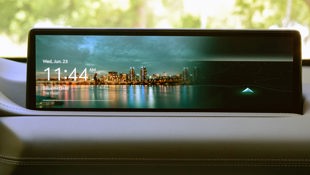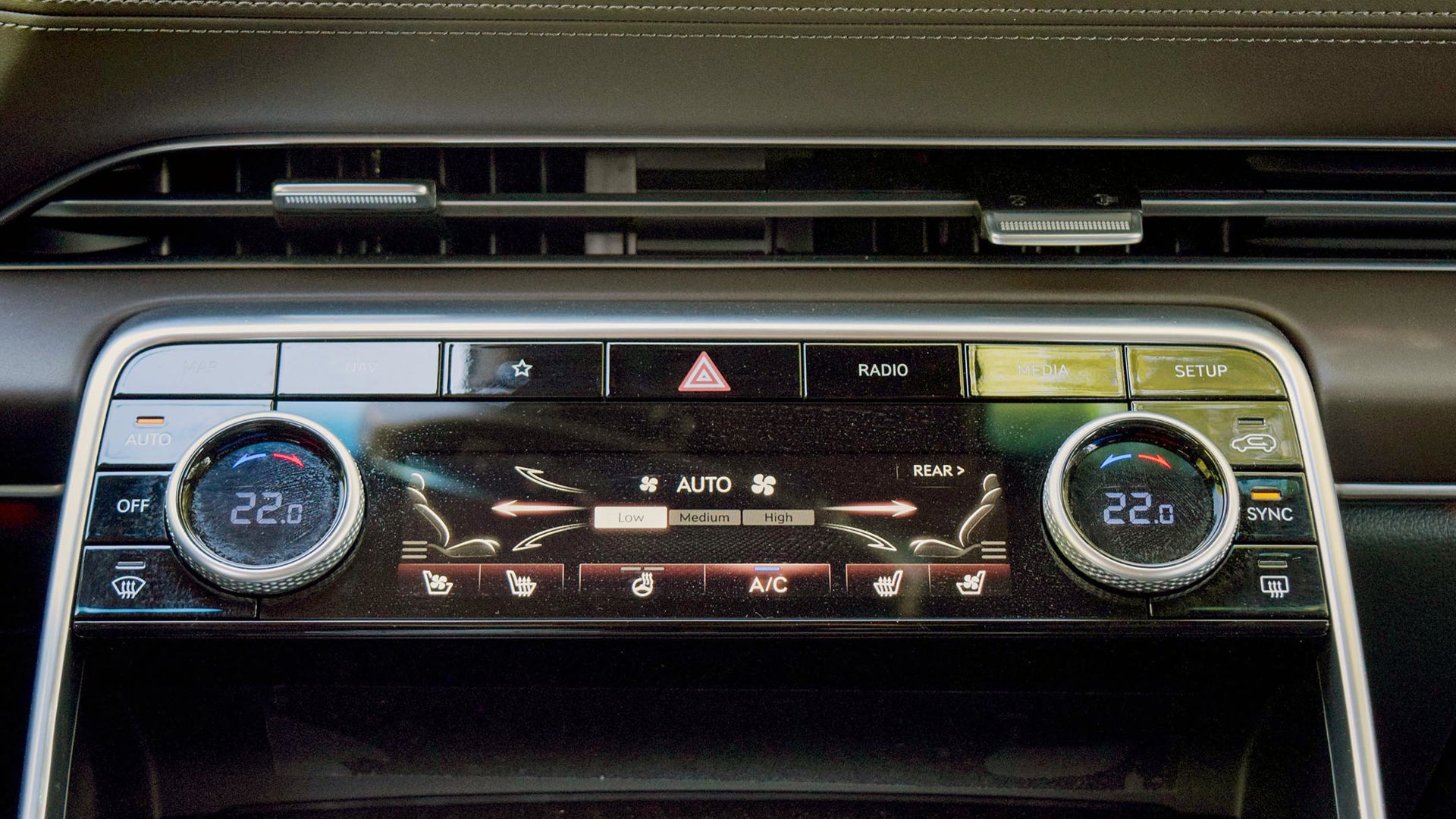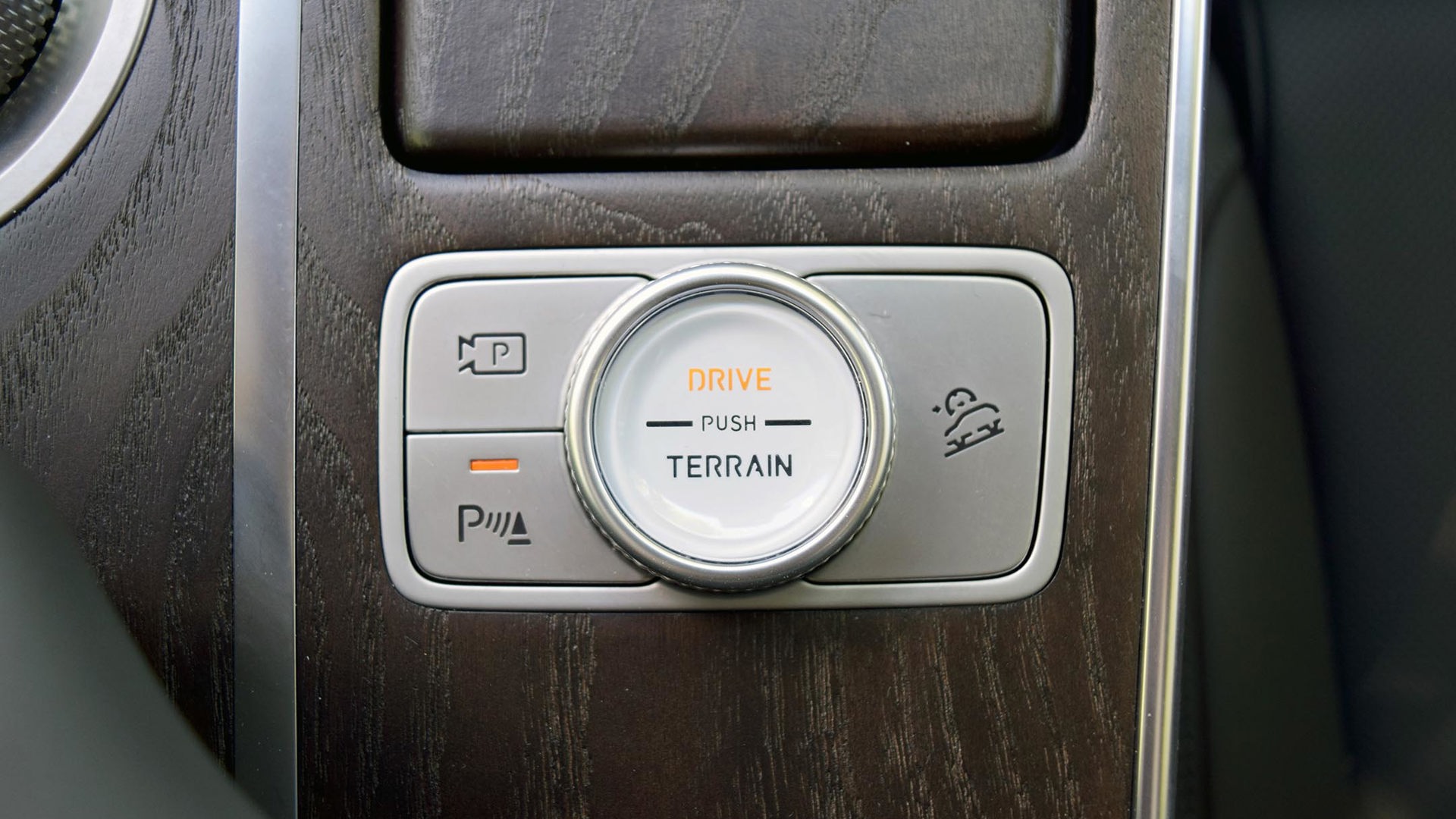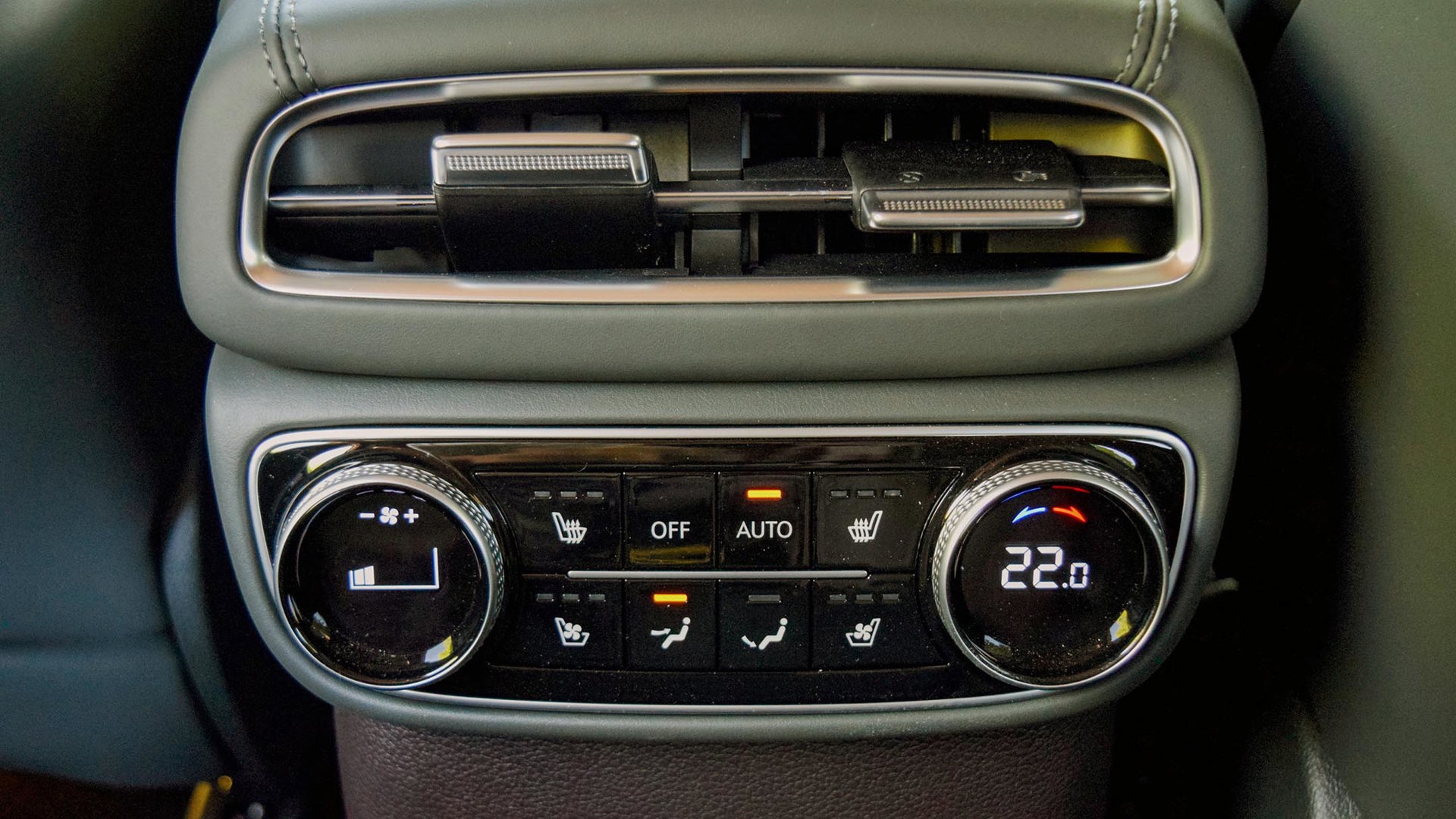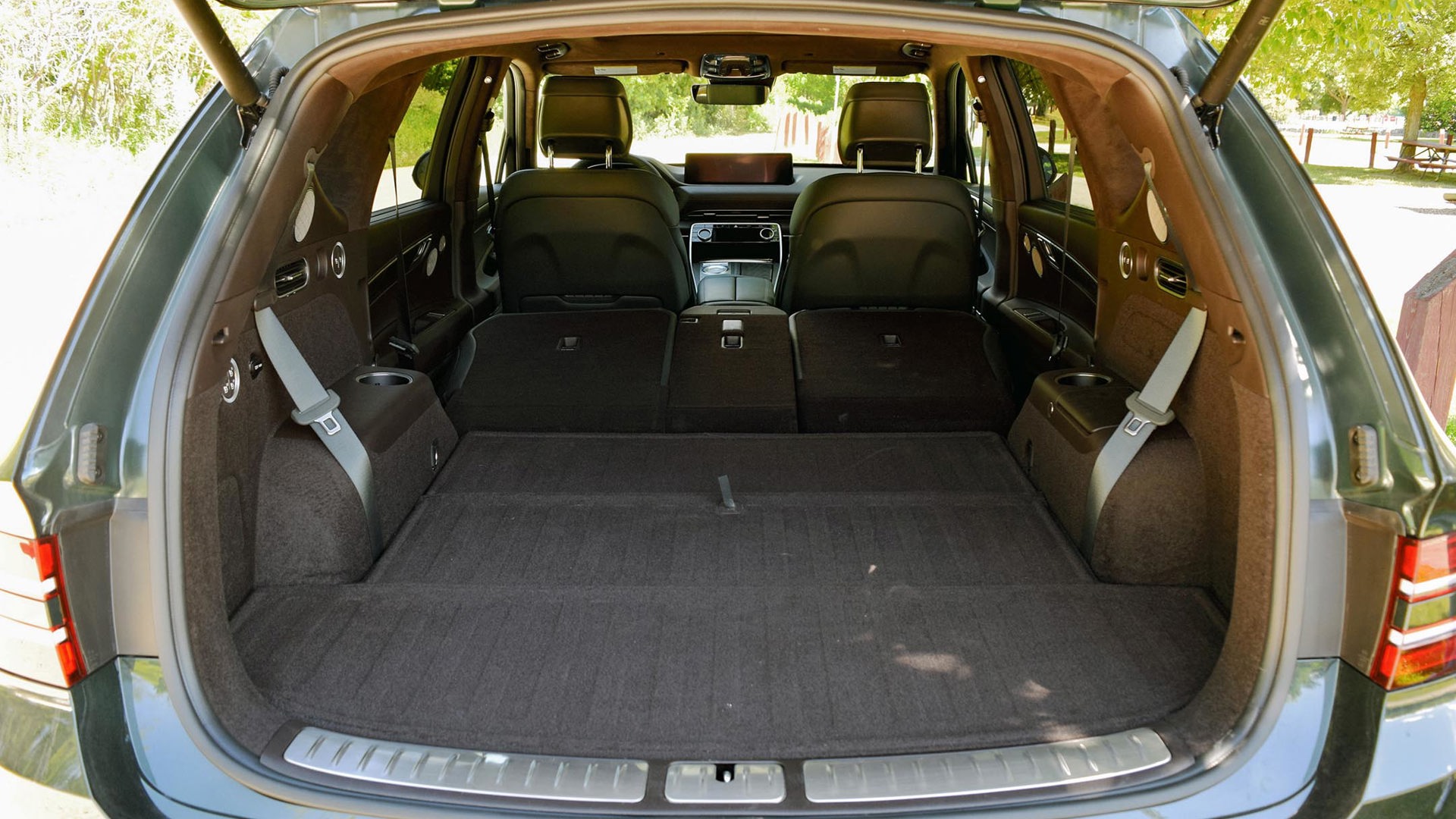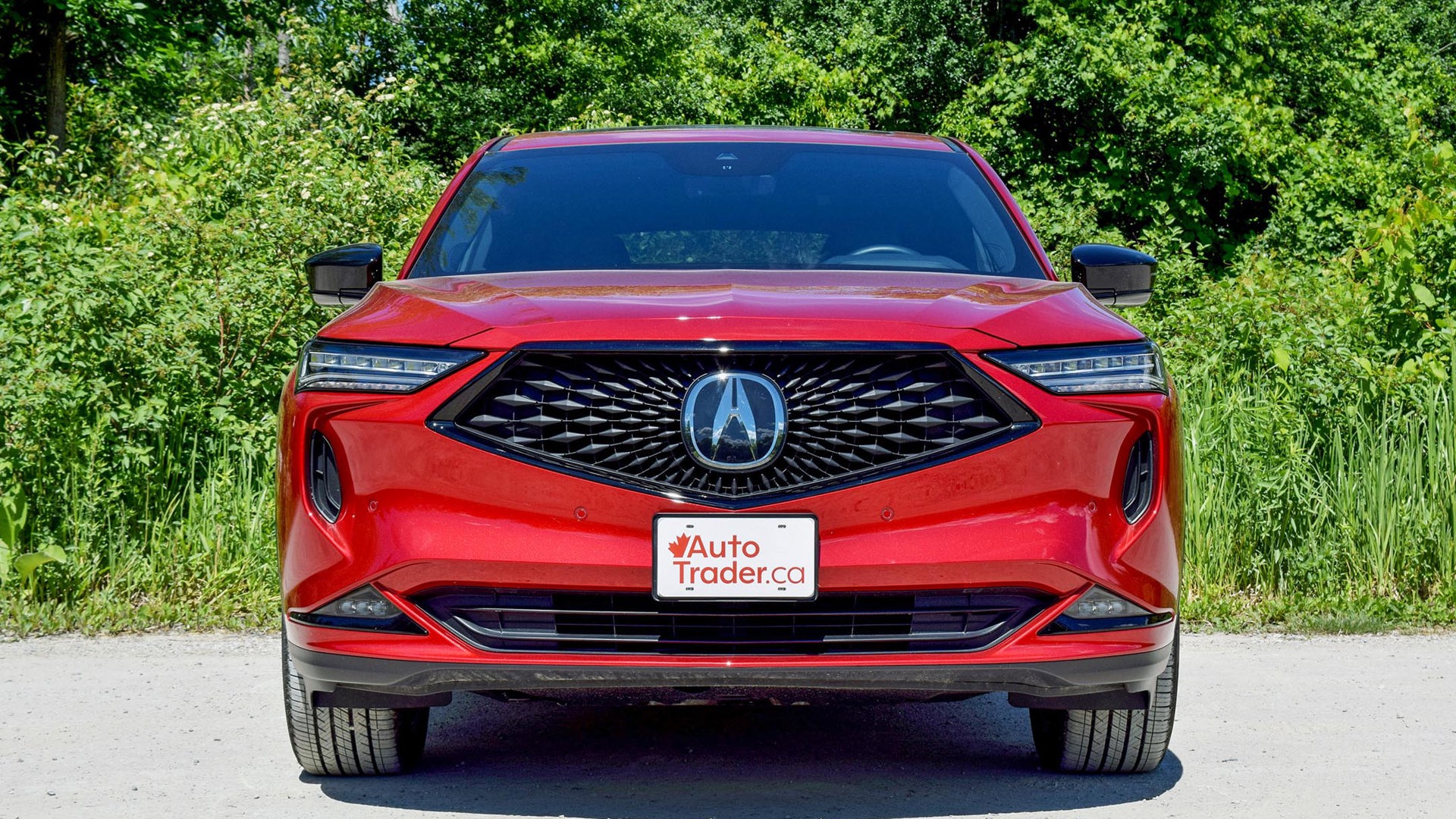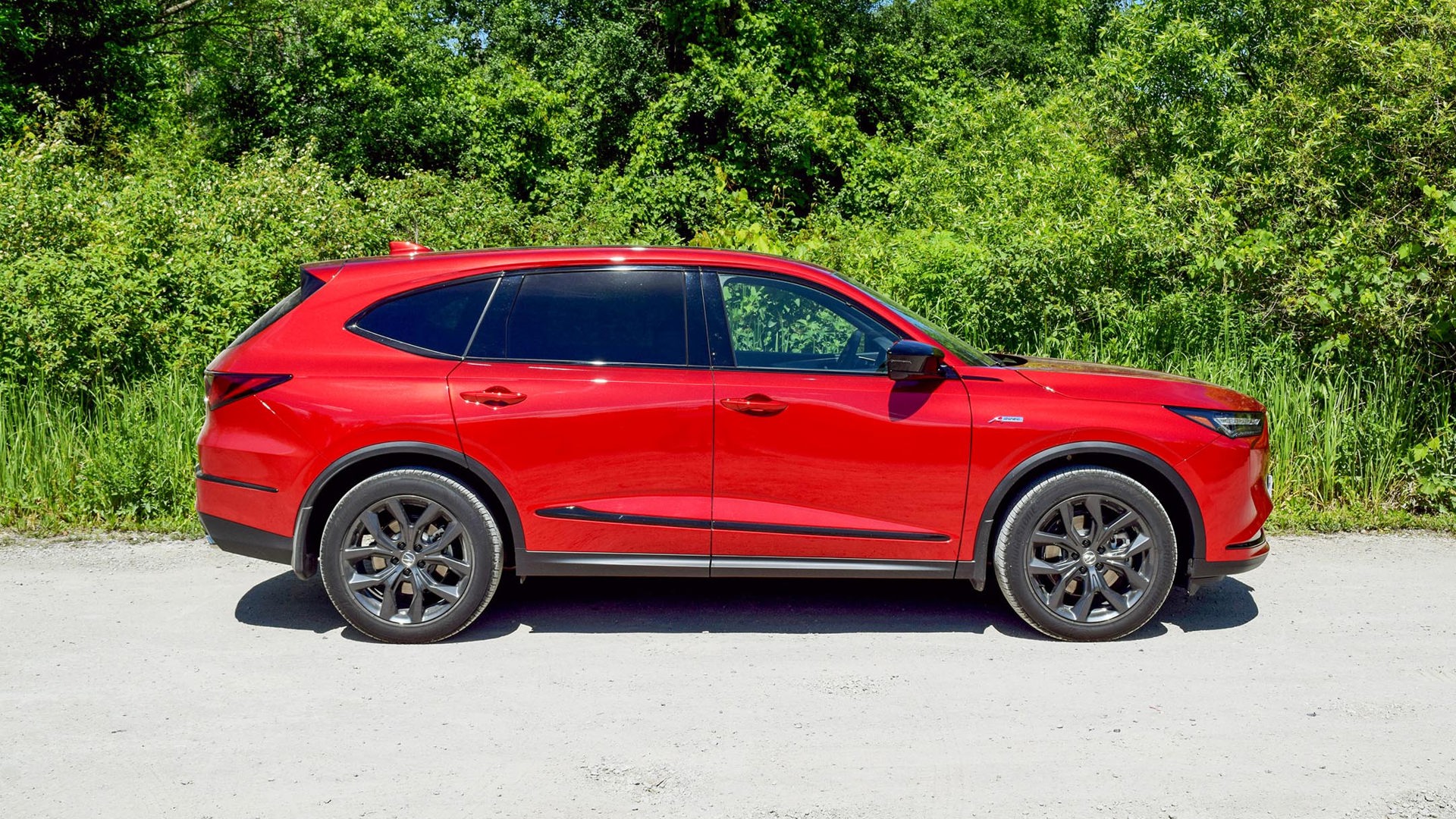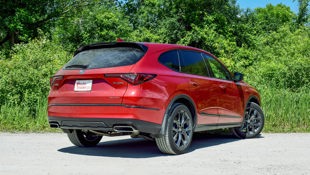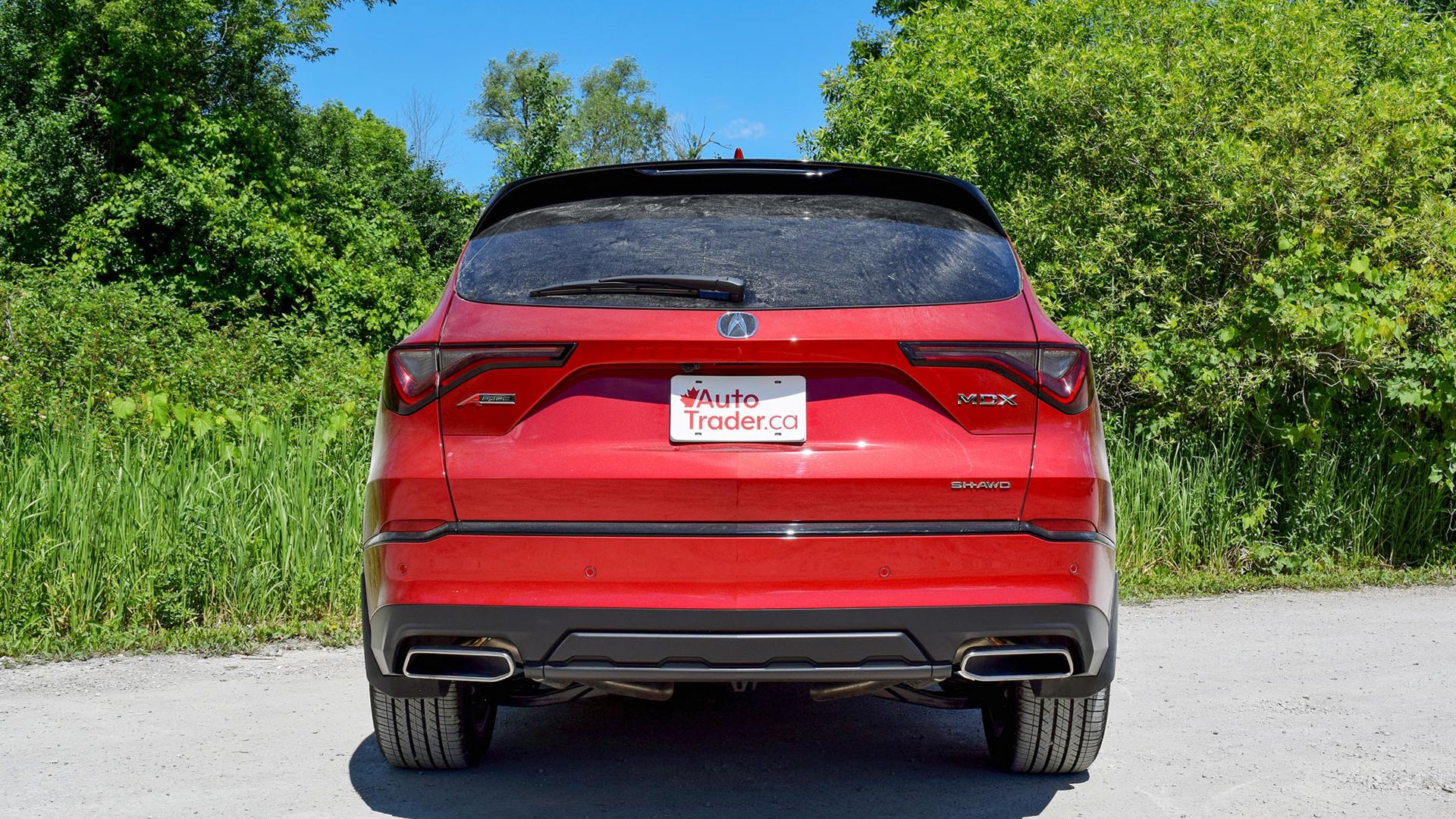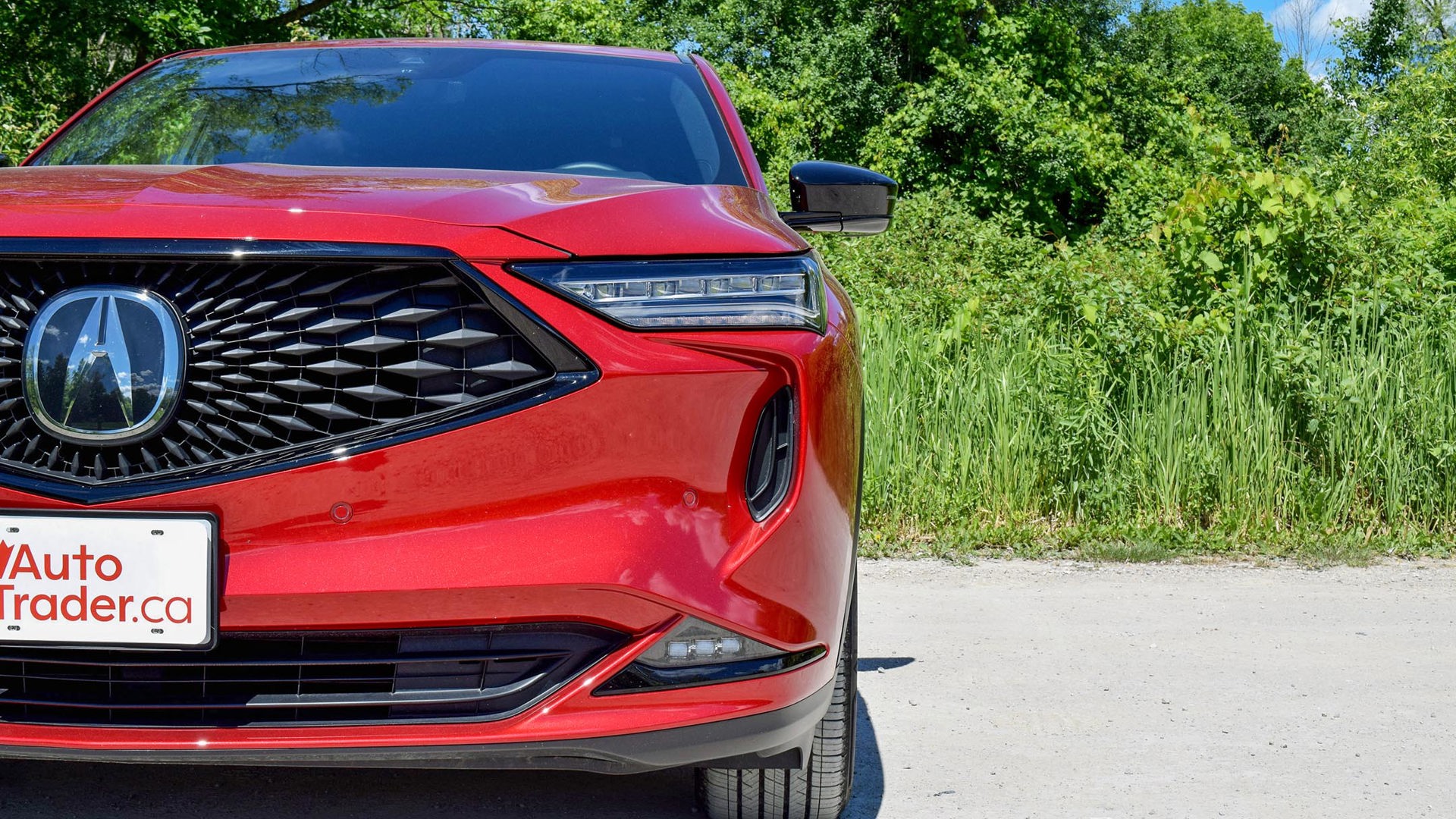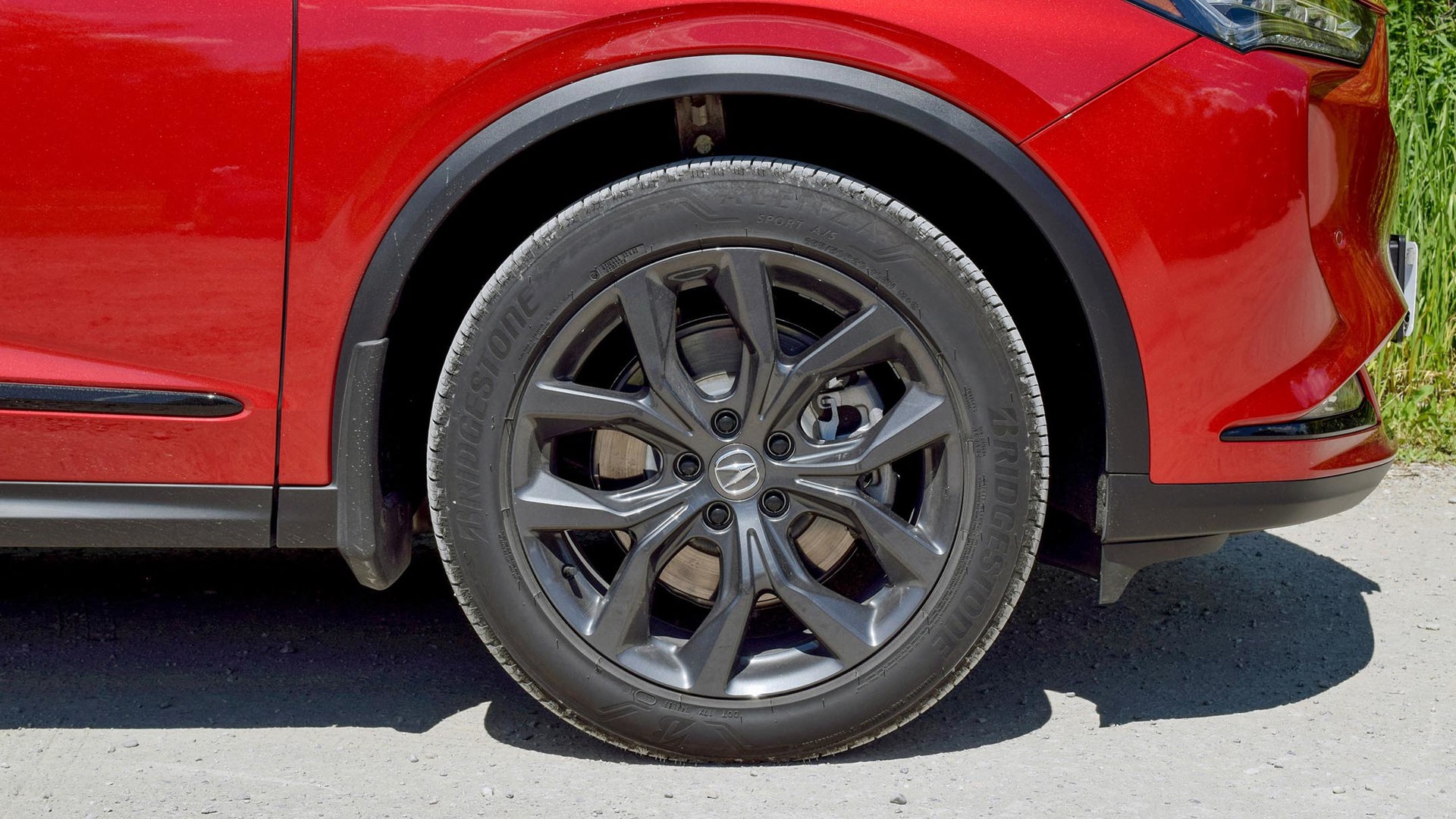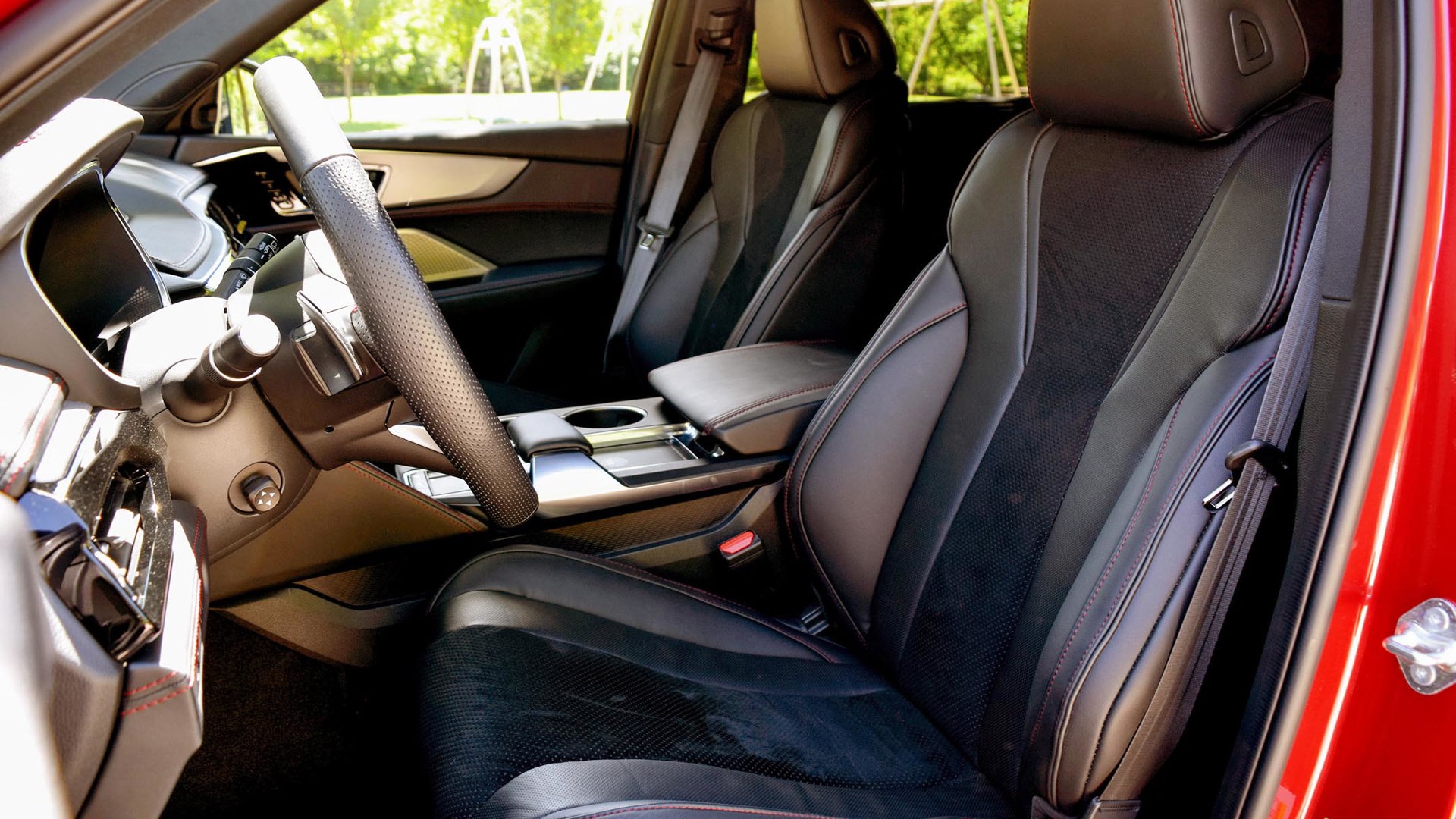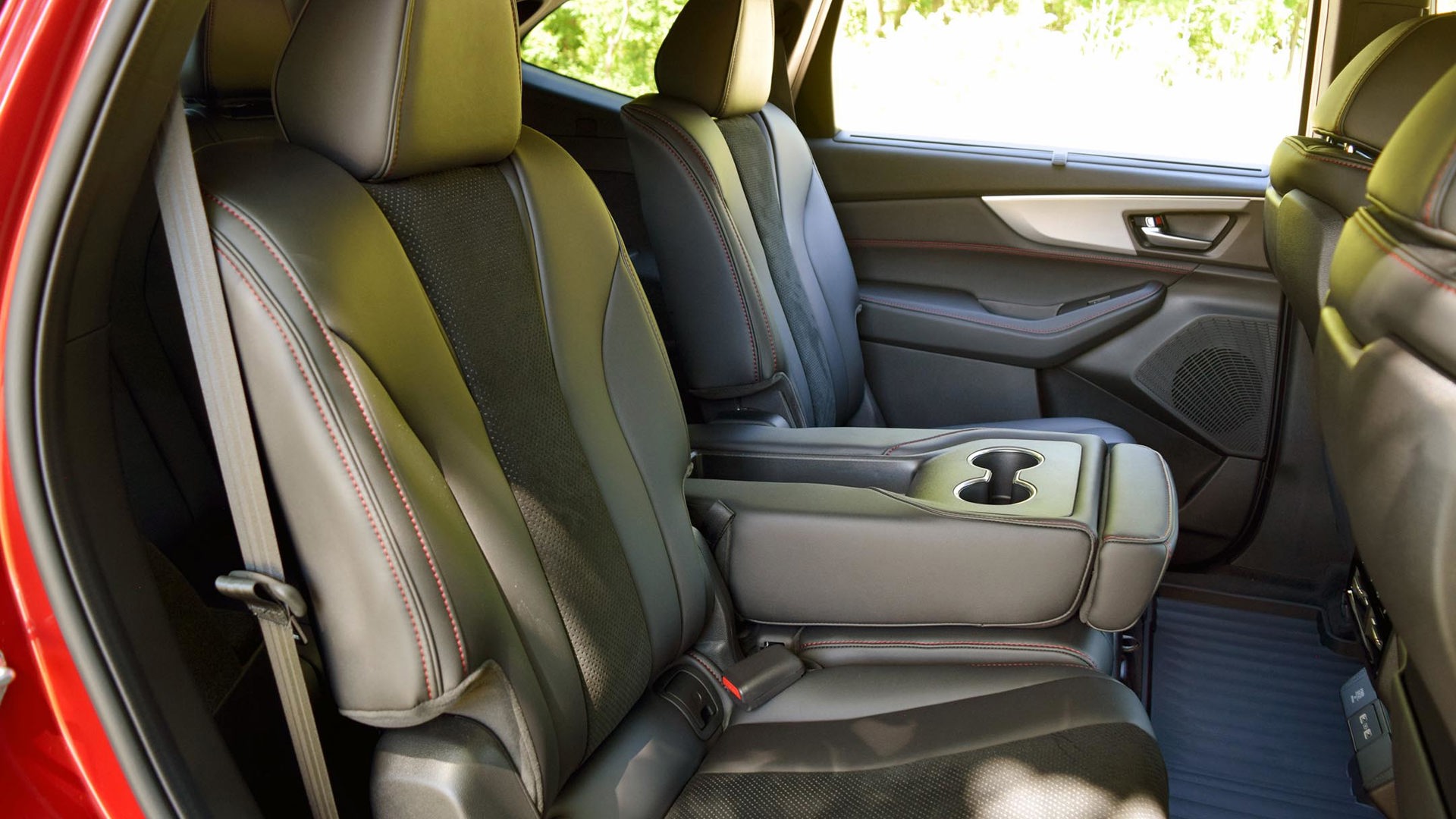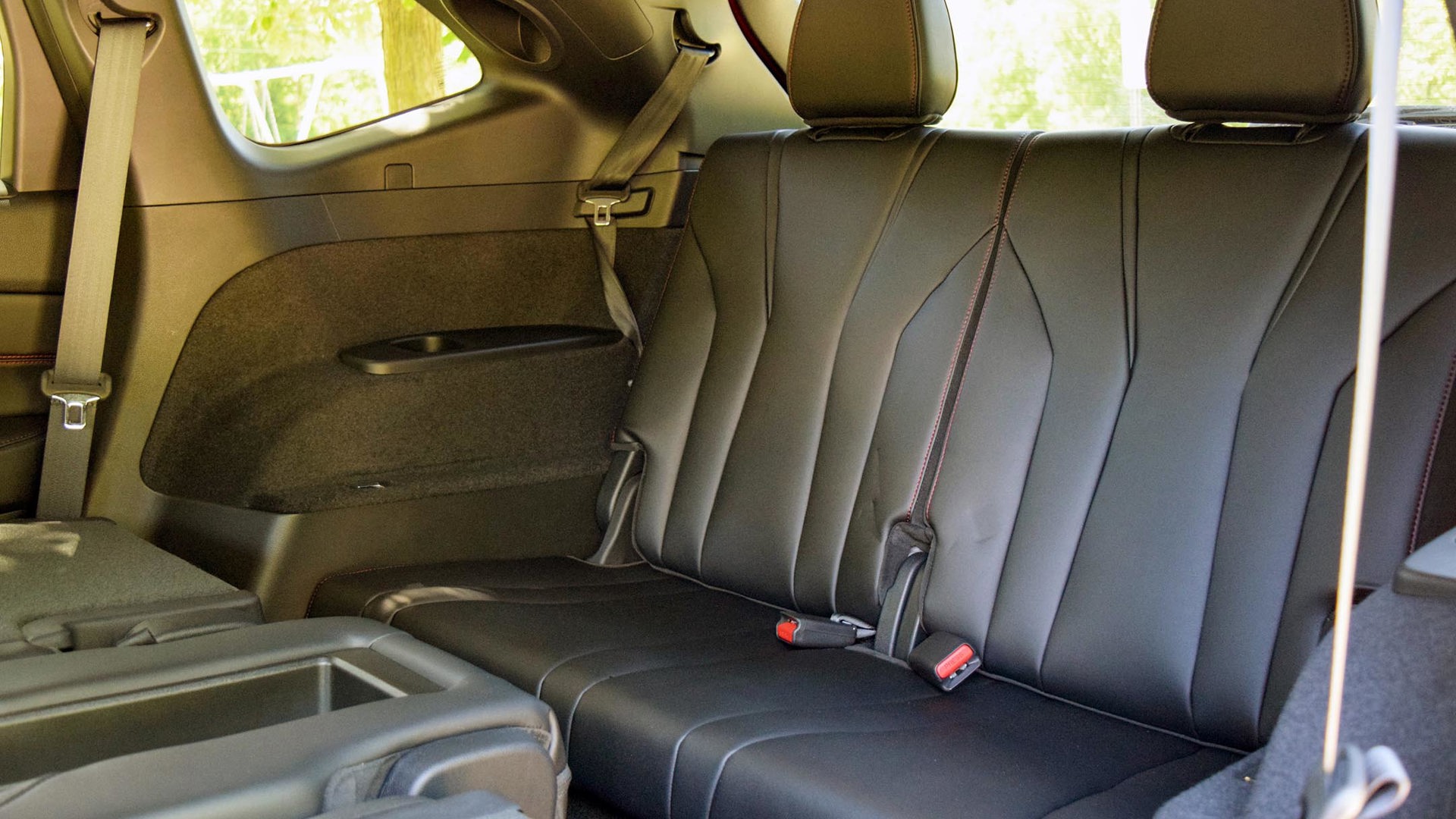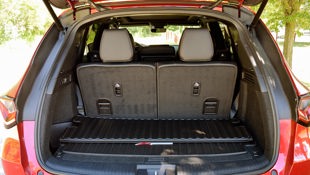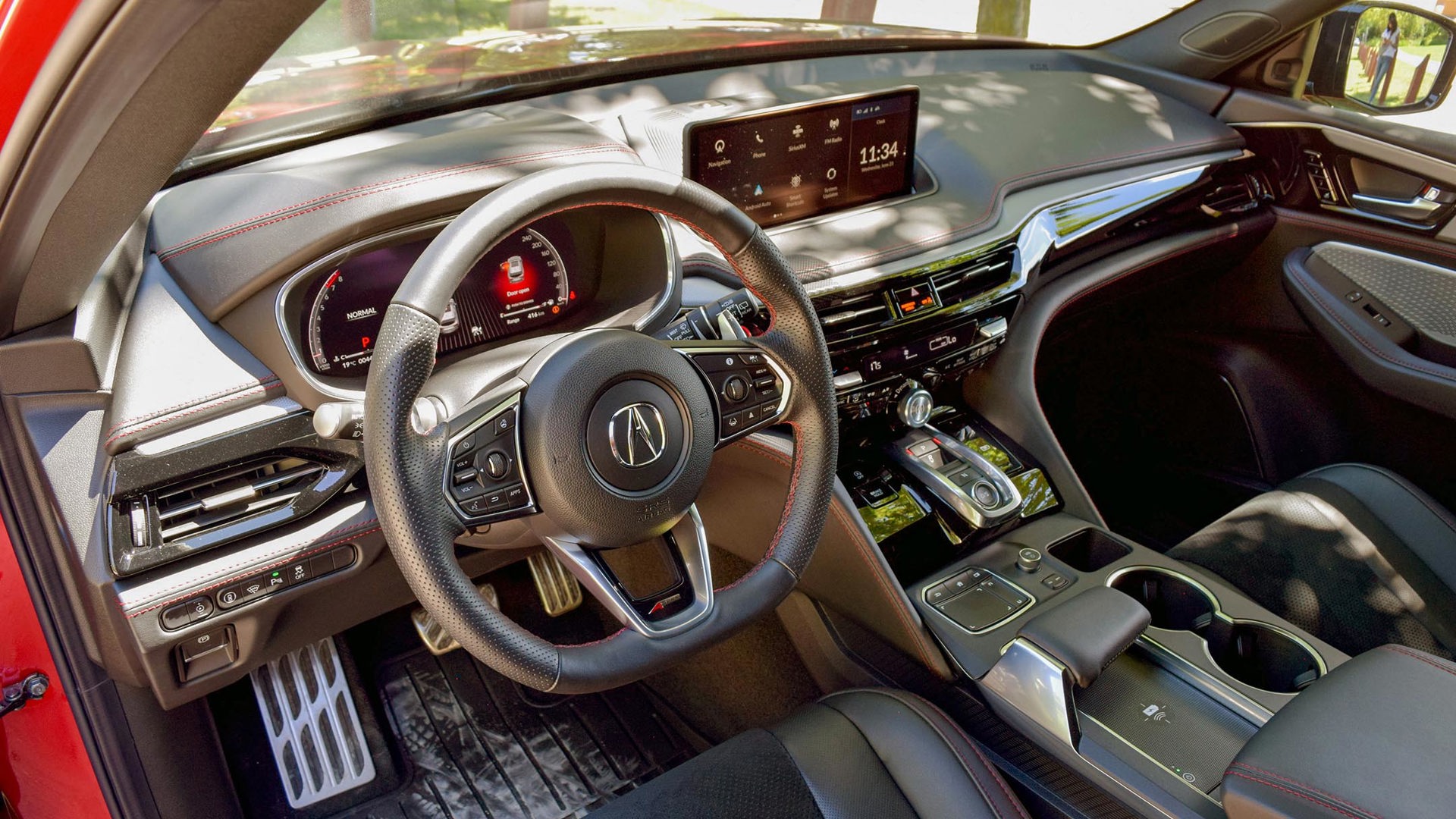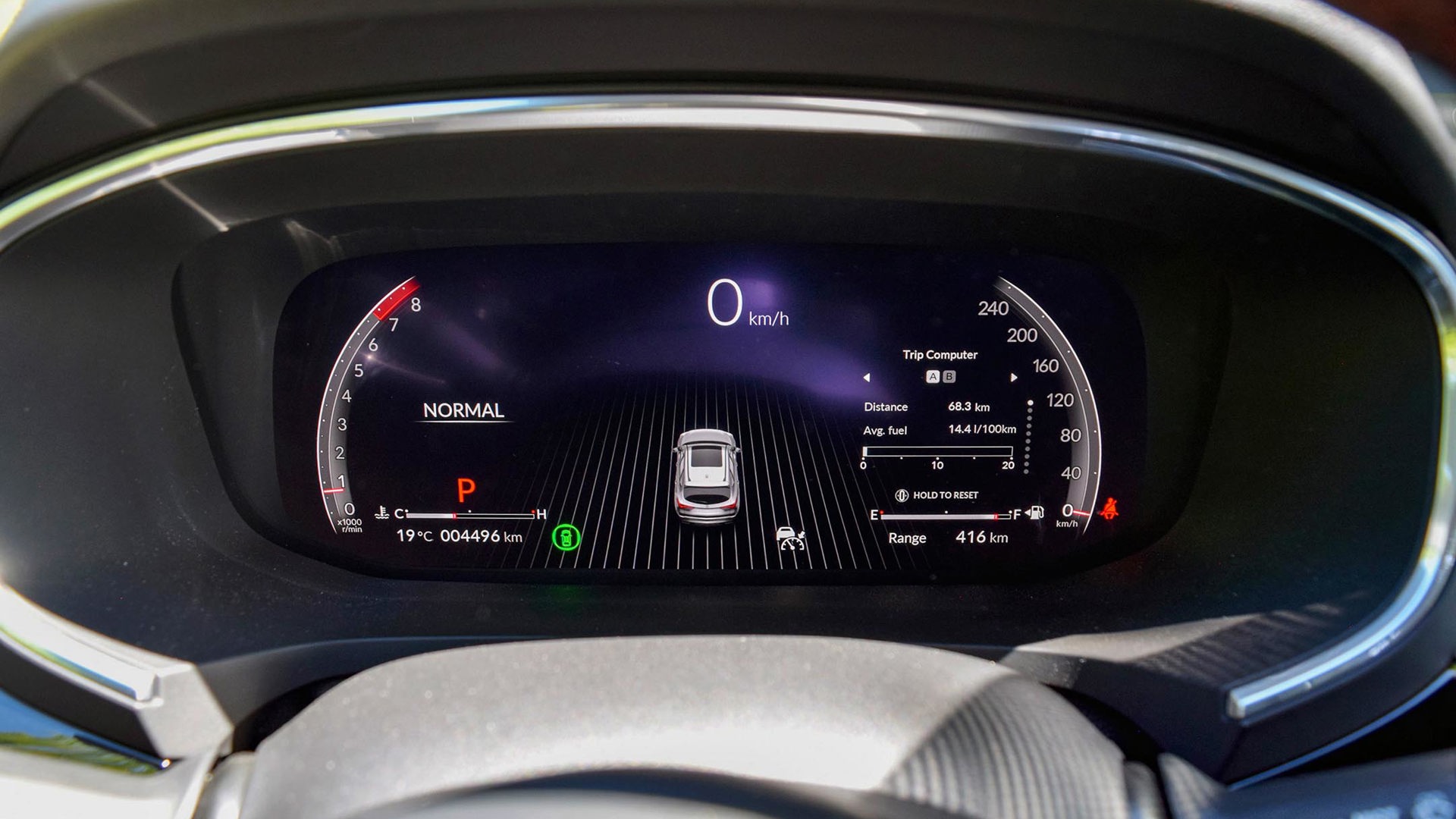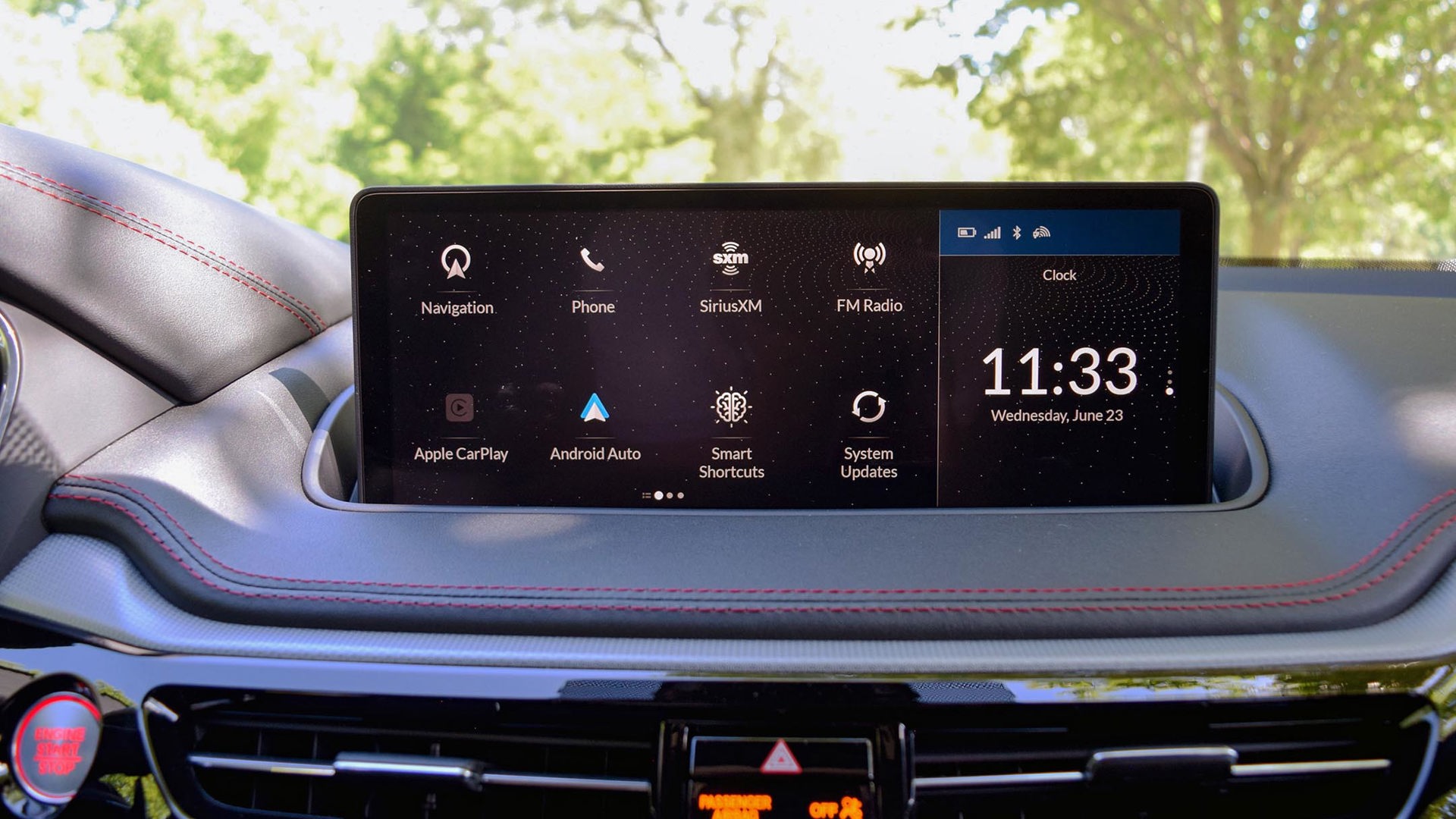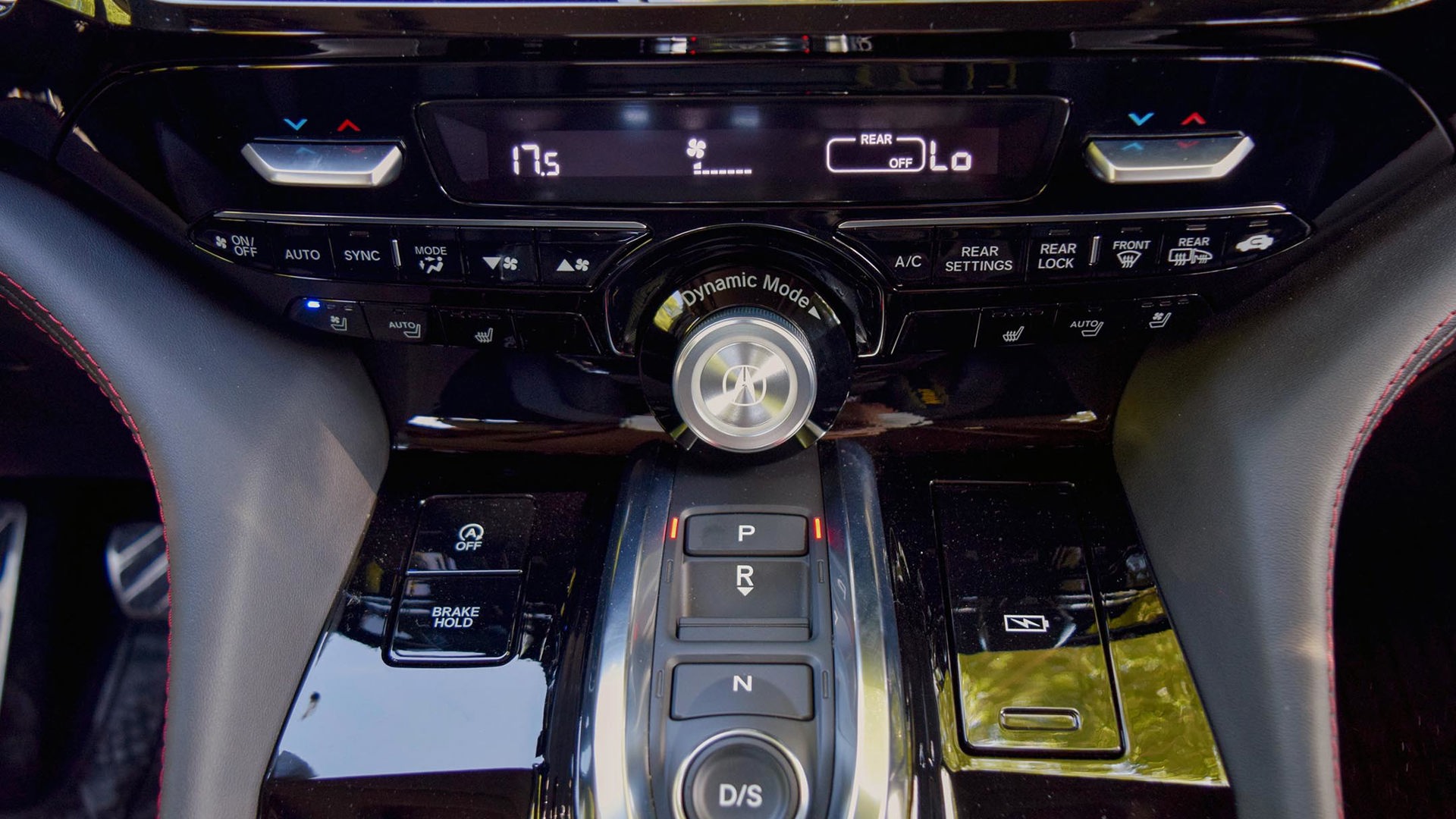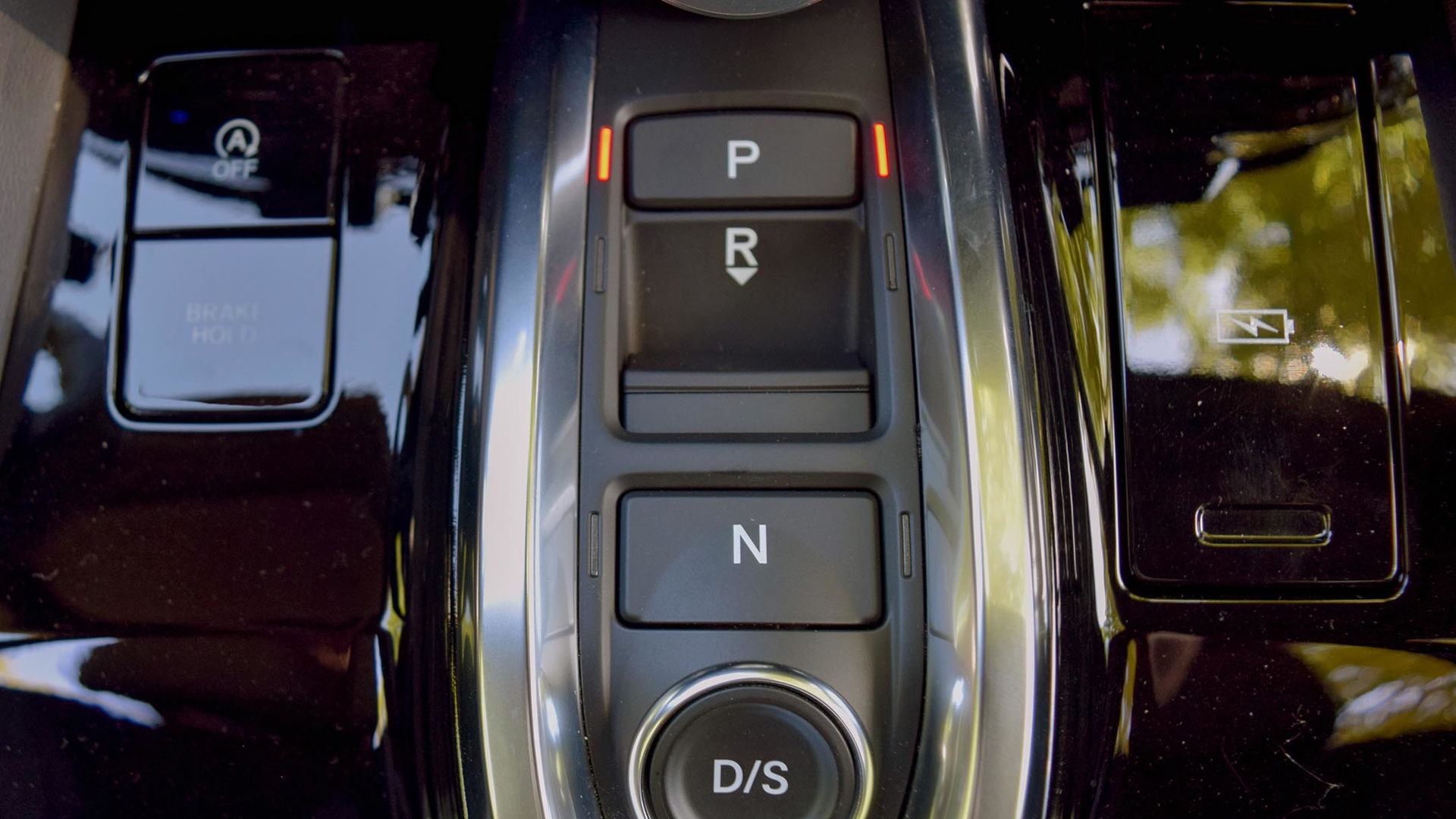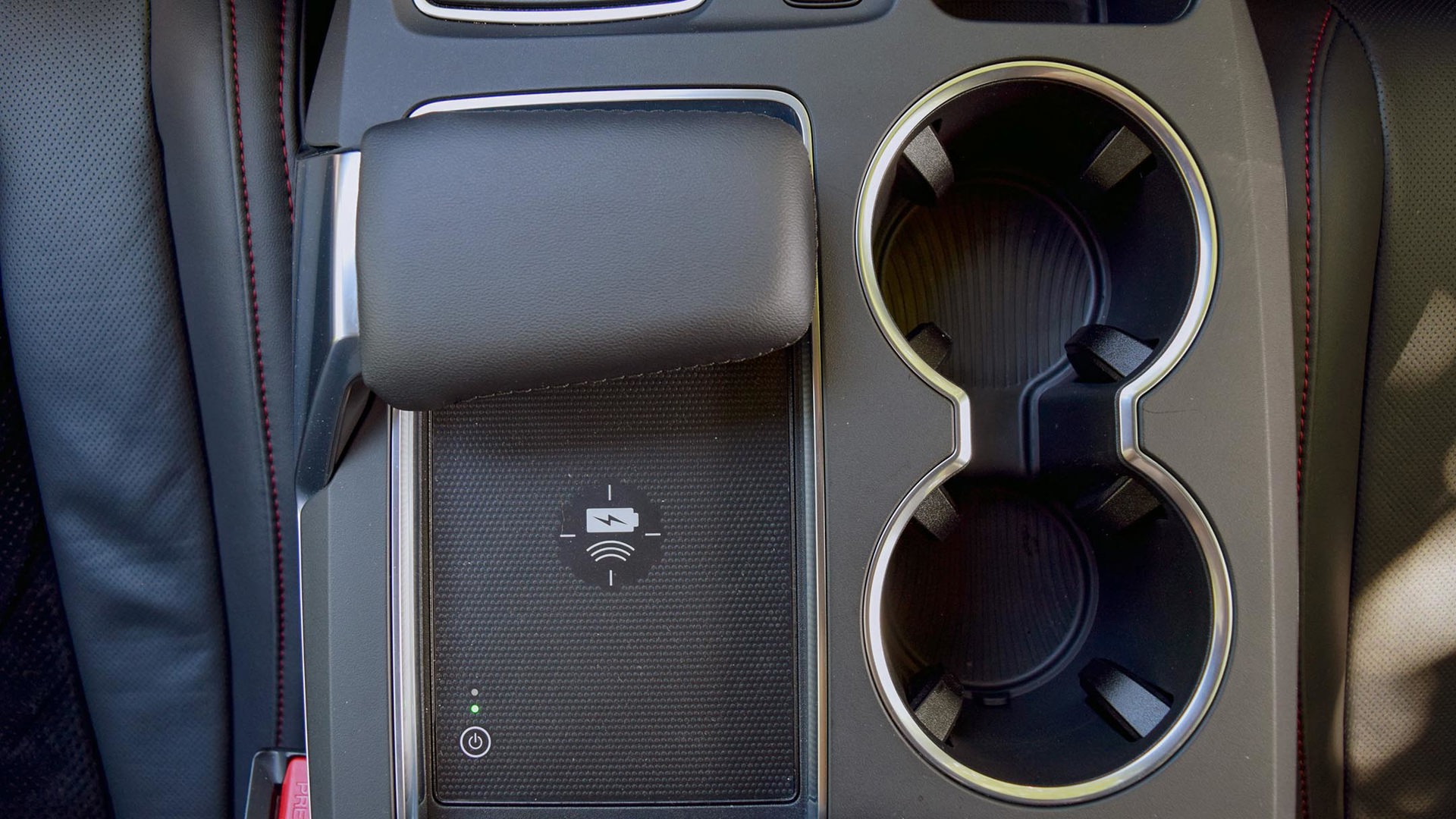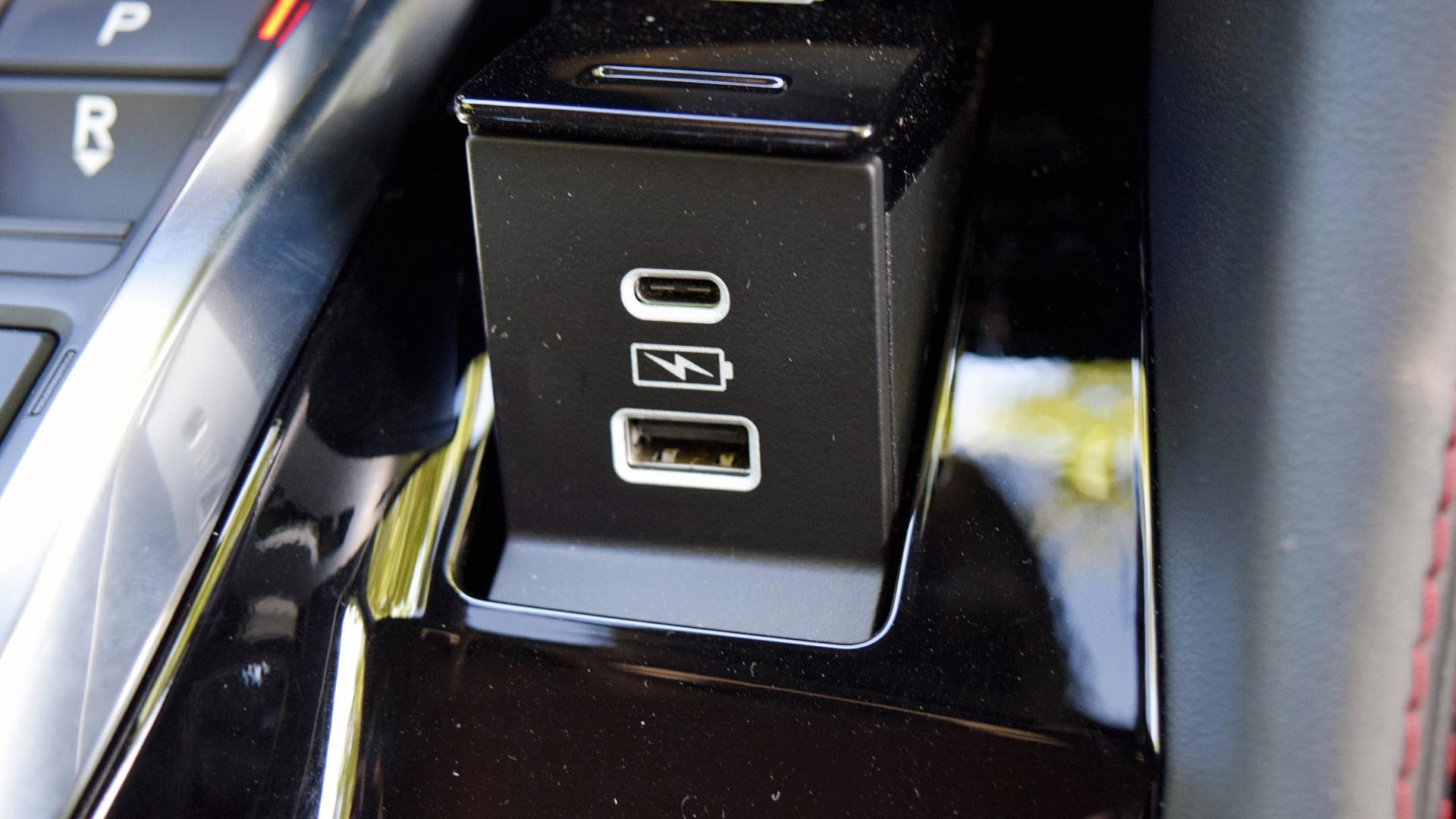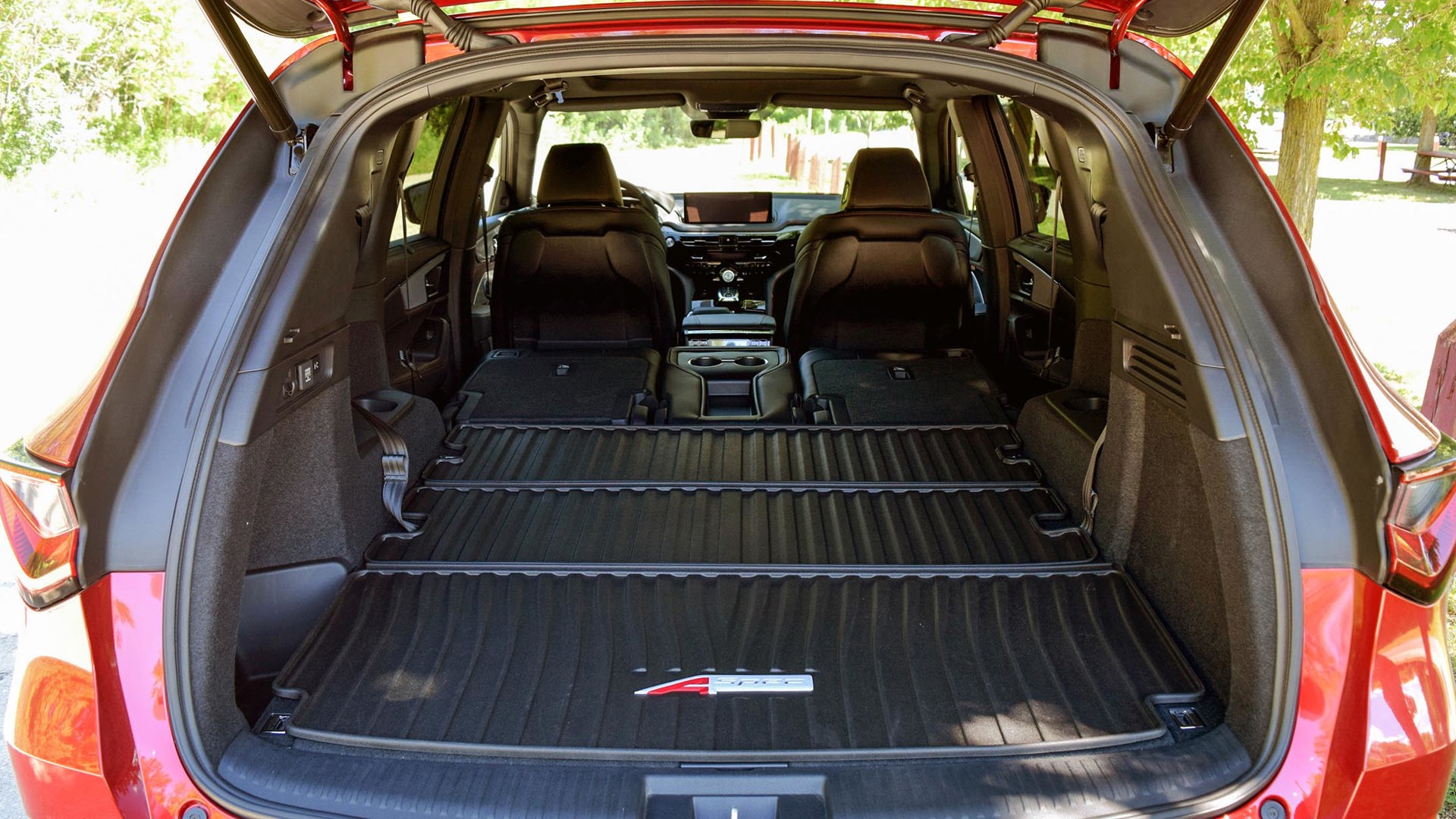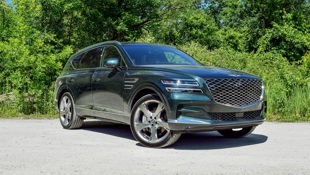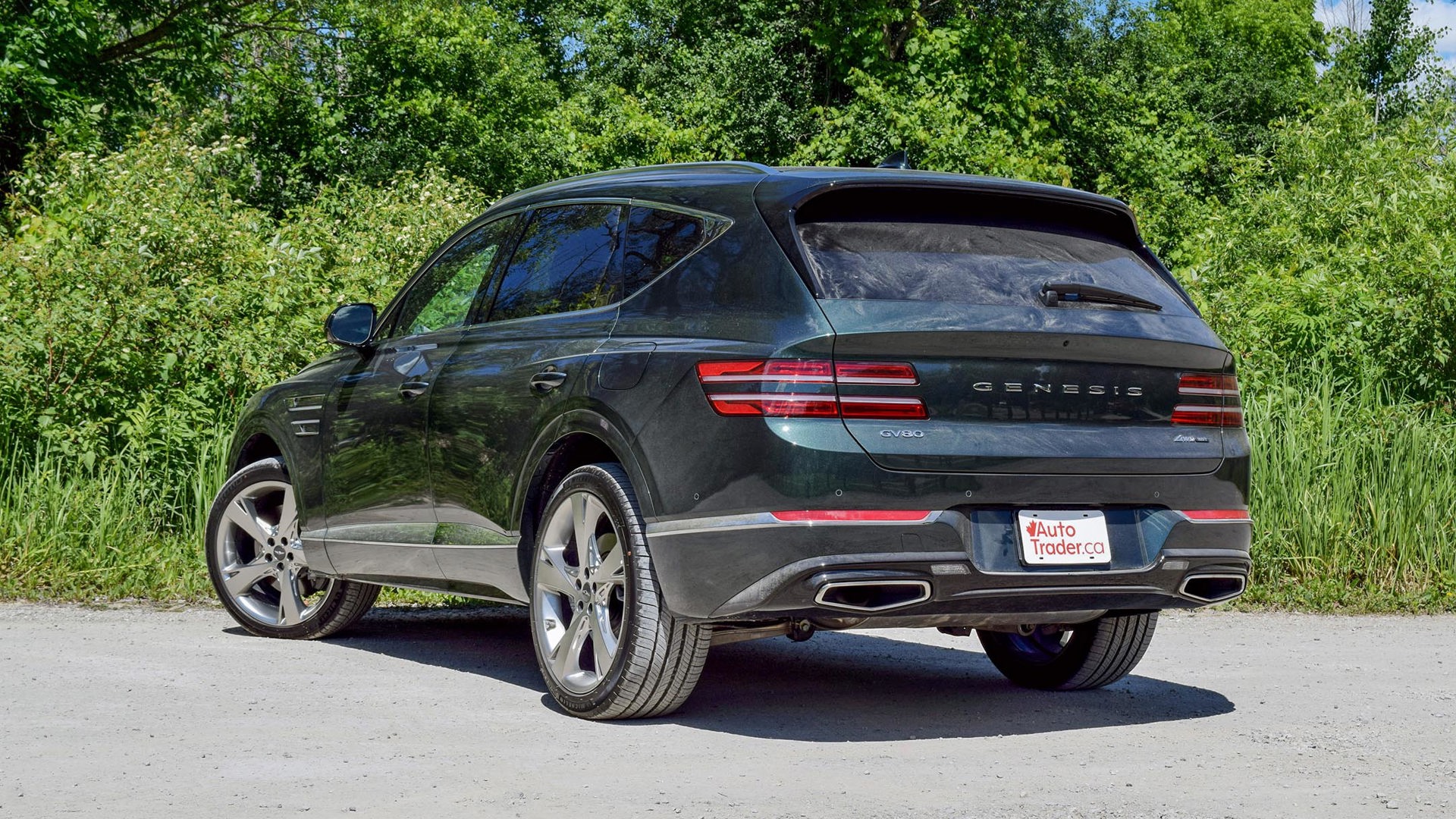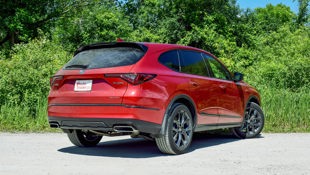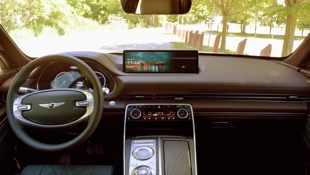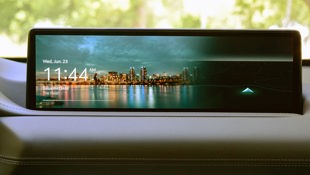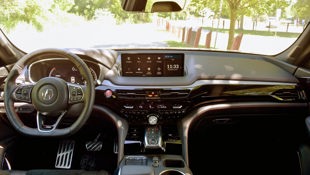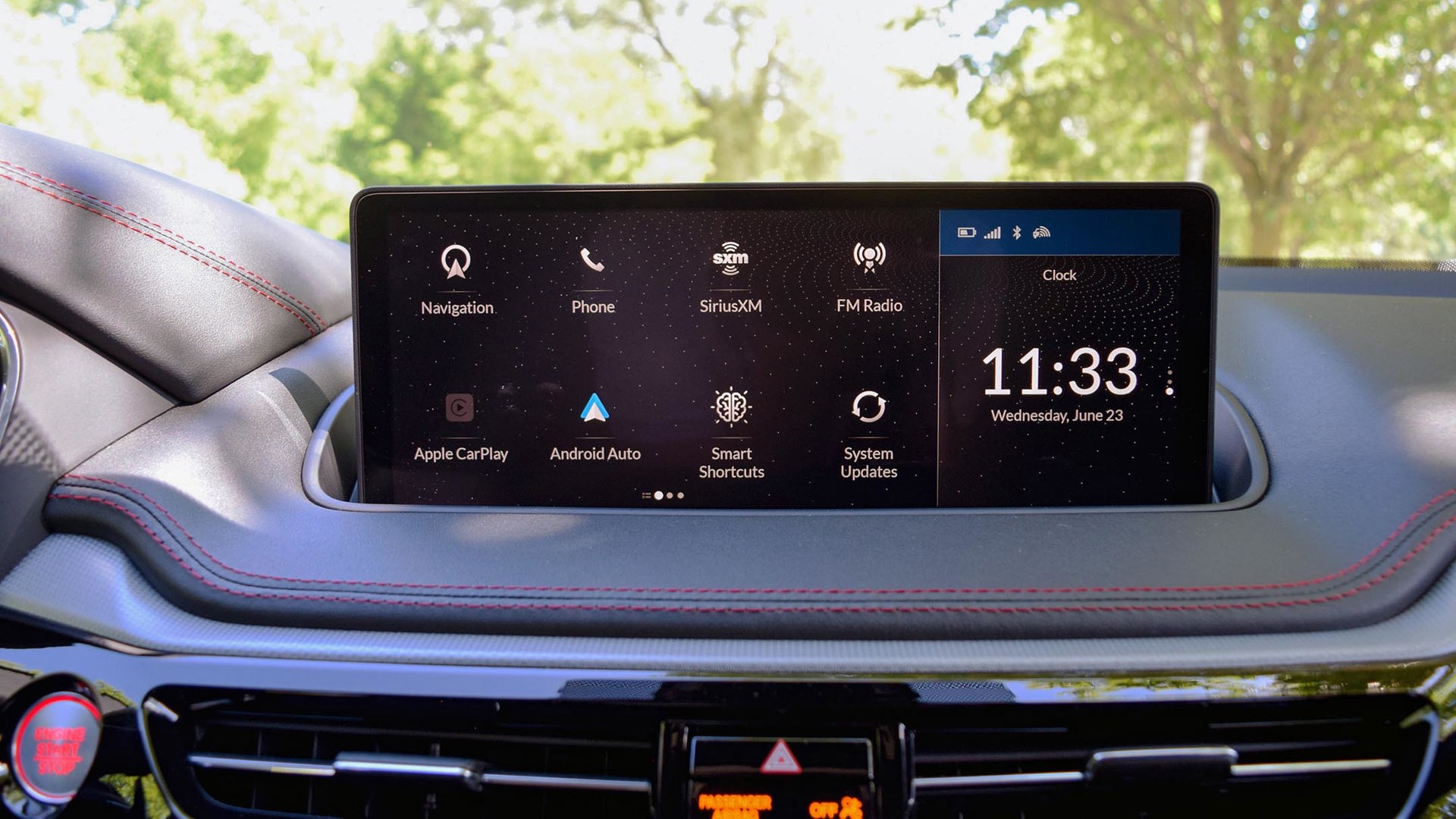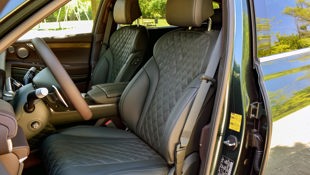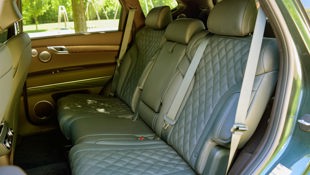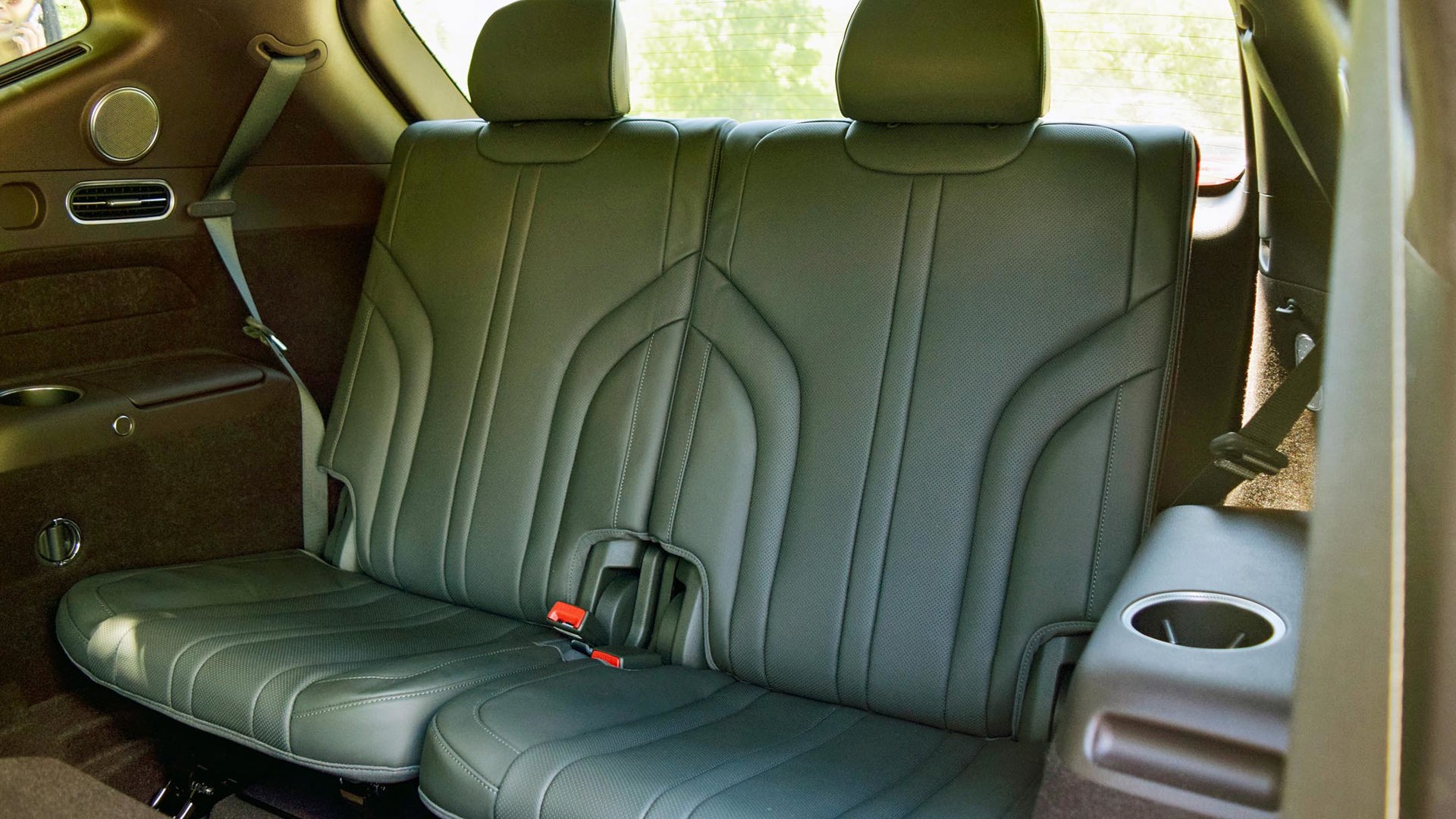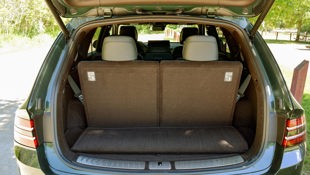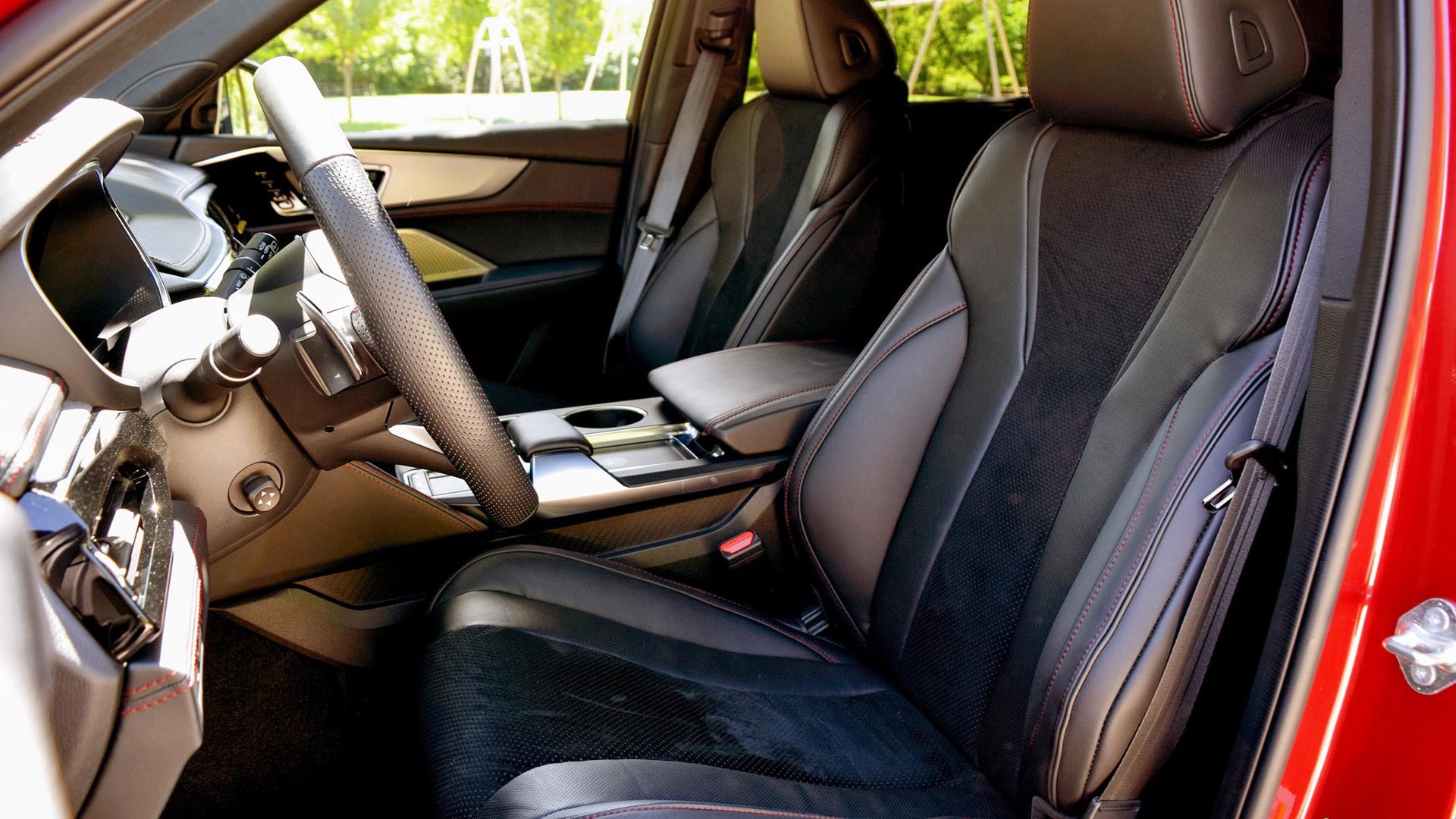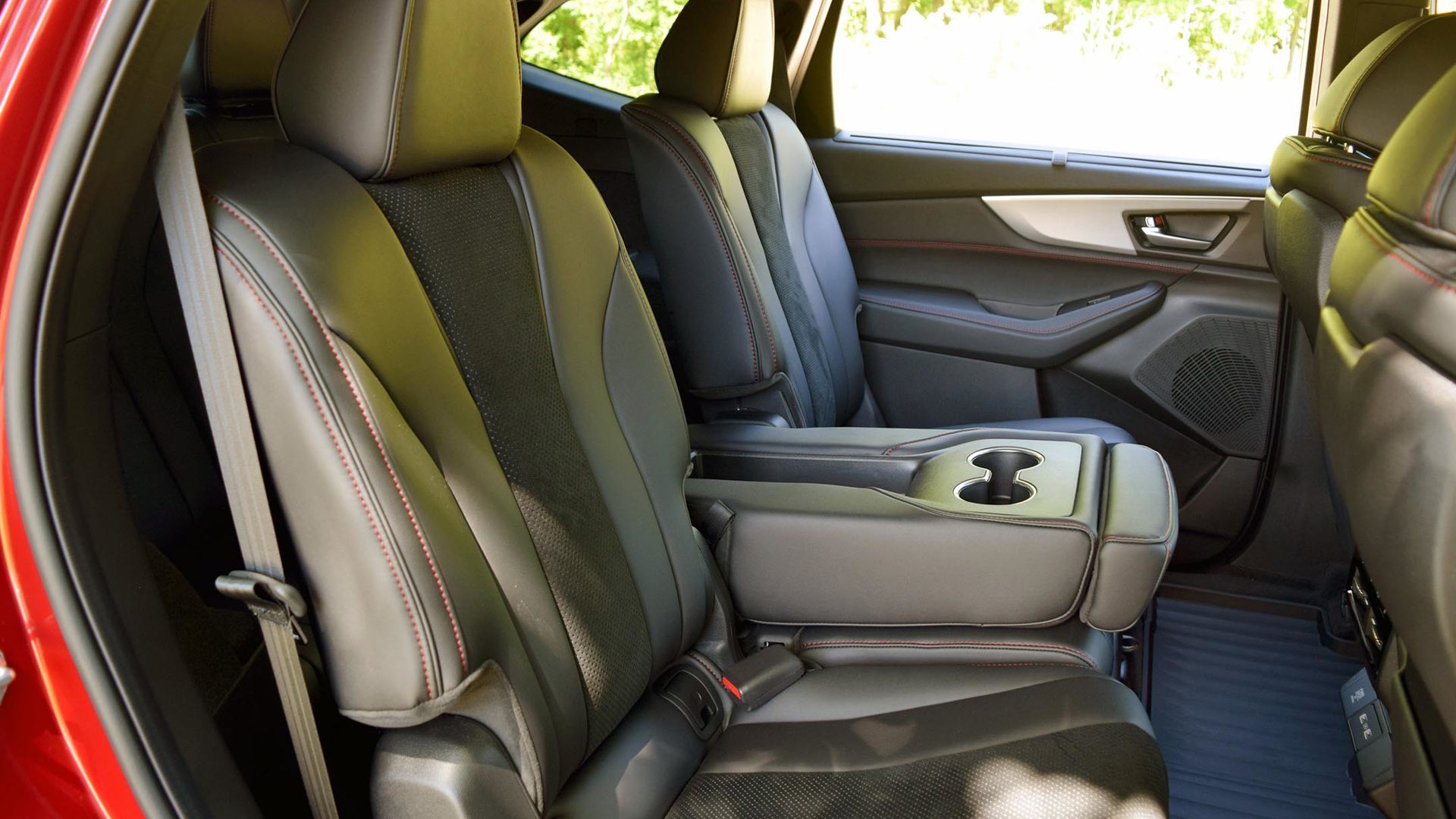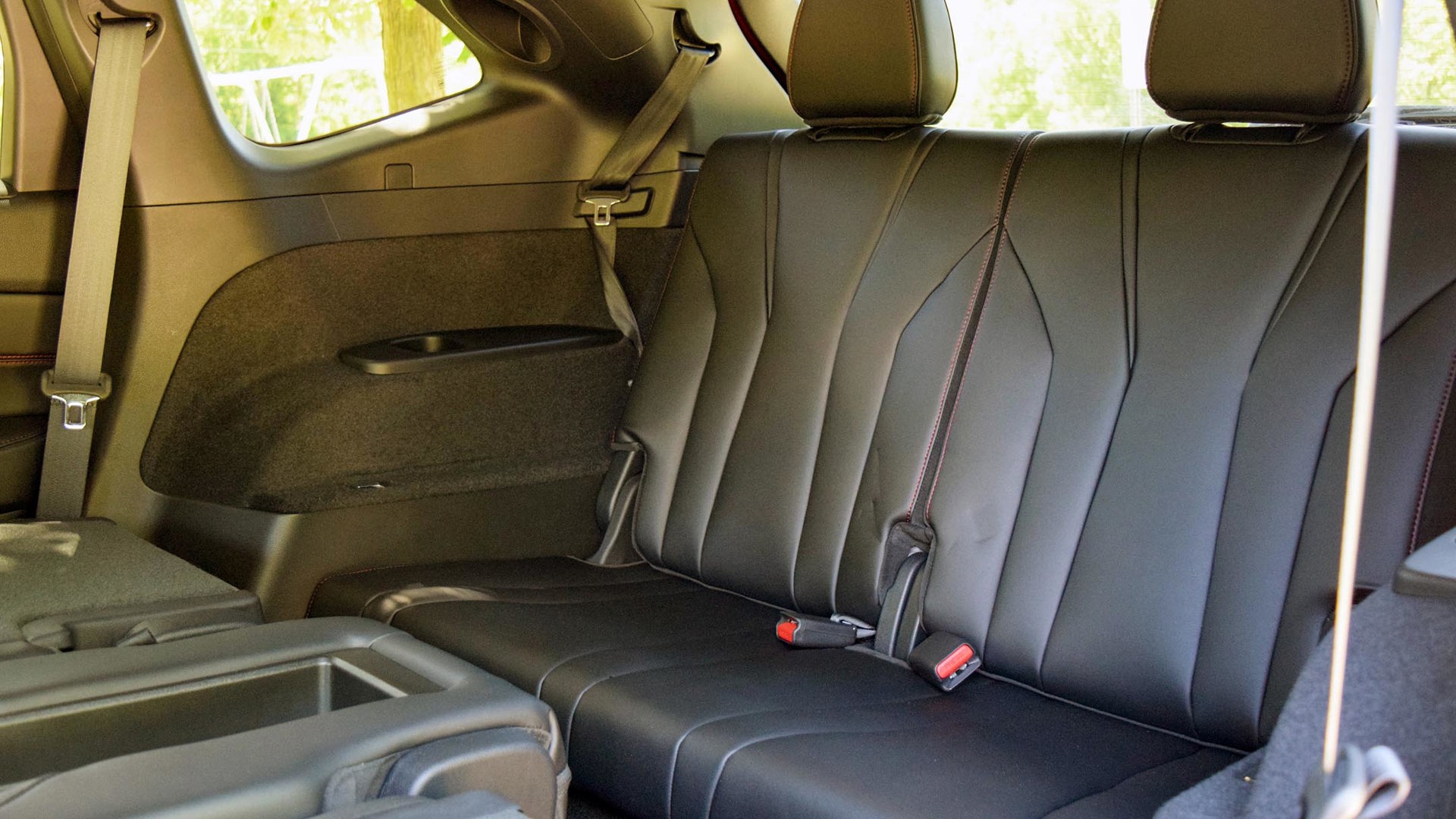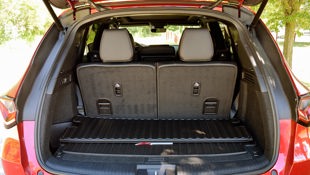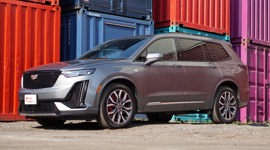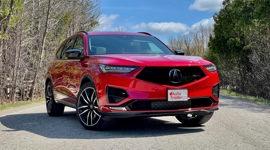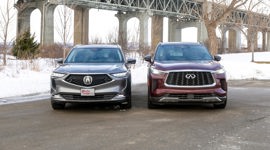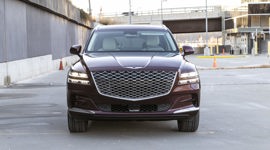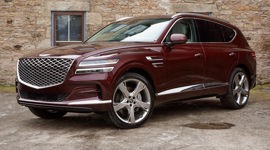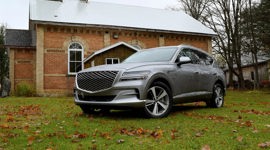Comparison Data
|
2021 Genesis GV80 3.5T Prestige
|
2022 Acura MDX A-Spec
|
|---|---|
|
Engine Displacement
3.5L
|
3.5L
|
|
Engine Cylinders
V6
|
V6
|
|
Peak Horsepower
375 hp
|
291 hp
|
|
Peak Torque
391 lb-ft
|
267 lb-ft
|
|
Fuel Economy
12.9 / 10.4 / 11.8 L/100 km cty/hwy/cmb
|
12.6 / 9.4 / 11.2 L/100 km cty/hwy/cmb
|
|
Cargo Space
328 / 991 / 2,144 L behind 3rd/2nd/1st row
|
513 / 1,368 / 2,690 L behind 3rd/2nd/1st row
|
|
Base Price
$85,000
|
$63,405
|
|
A/C Tax
$100
|
$100
|
|
Destination Fee
Included
|
$2,075
|
|
Price as Tested
$85,100
|
$66,080
|
|
Optional Equipment
None
|
$500 – Paint, $500
|
When the Acura brand was introduced, it caught the industry by surprise.
Established brands had a major head start, but Honda’s new luxury brand was a shot across the segment’s bow, with impressive products for their day that quickly made a name for the brand. Fast-forward 35 years and a lot has changed, with Acura now counting among the traditional premium players, with Hyundai’s spin-off Genesis brand ready to go head-to-head. And what better way to see how these two compare than with their family-friendly SUVs.
The redesigned 2022 Acura MDX looks similar to its well-received predecessor, but it has gained a ton of new technology inside the cabin and underneath its sheet metal. The 2021 Genesis GV80 is the brand’s first family-oriented vehicle. Should the old guard be worried?
Styling
Everything about the Genesis GV80 seems big, especially the boisterous grille and wheels, but the automaker has made efforts to emphasize a few small details. A mesh-like pattern repeats around the vehicle, as do dual-strip LED lights. The latter is the GV80’s design signature, with the split lights starting up front, extending along the fenders, and appearing again in the taillights.
However, the interior is where the automaker makes its mark and impresses in almost every dimension. From textured controls to stitched quilted patterns in the upholstery with colourful leather options and the superb feeling of open-pore wood, the GV80 exudes an aura of high class within the cabin. That experience isn’t reserved for the occupants up front either, and second-row passengers are treated to the same specialness.
The redesigned 2022 Acura MDX looks similar to past versions, with sharp edges all around. The design works to hide the vehicle’s size, making it appear less imposing and intimidating than the GV80. Overall, it’s attractive though a little familiar.
Inside, the MDX doesn’t seem as high-end or glamorous as the Genesis. While the seats use soft faux suede inserts, the accents and panels around the cabin feel cheap. The layout is confusing, too, with odd control placement, like the drive mode knob that’s large and central to the console, while volume and tune controls are much smaller and located by the infotainment trackpad.
Genesis GV80: 9/10; Acura MDX: 7/10
Safety
Both vehicles have been awarded the coveted Top Safety Pick+ rating from the Insurance Institute for Highway Safety (IIHS), and it’s hard to argue with the organization when it comes to the safety features found here.
The Genesis GV80 includes items like forward collision warning with automatic emergency braking, lane-keep assist, blind-spot monitoring with rear cross-traffic alert, adaptive cruise control, as standard equipment, along with a segment-exclusive front centre airbag. Driver attention monitoring, remote parking, a surround-view monitor, and a camera-based blind-spot monitoring system are available.
The MDX keeps up in terms of its safety and driver assistance tech. Standard equipment includes forward-collision braking with pedestrian detection, lane-keeping assist, blind-spot monitoring with rear cross-traffic alert, and adaptive cruise control. It lacks the gimmicks of the Genesis, but that’s about it.
Genesis GV80: 9.5/10; Acura MDX: 9/10
Features
Genesis offers nearly every conceivable gadget and doodad in the GV80 and throws in a few gimmicks, too. The wide 14.5-inch touchscreen infotainment system features Android Auto and Apple CarPlay support, while the sound system provides an impressive amount of noise cancellation. A 12.3-inch digital gauge cluster is available, too, and it features eye-tracking to provide a subtle 3-D effect. There’s also a huge head-up display in all but the base trim.
In addition to all that tech, the GV80 includes a heated steering wheel and front seats throughout the lineup, with all but the base version also getting ventilation functionality to go with heated rear seats. The top trim, meanwhile, gets ventilated second-row seats, as well as a basic massage system for the driver. There’s also stuff like dual sunroofs, rain-sensing wipers, a power tailgate, and power-folding third-row seats, though not all that stuff is standard – including the extra set of seats.
The MDX comes to this comparison with a shorter list of features. The infotainment screen is slightly smaller and controlled only by the touchpad, which can be frustrating. Fortunately, it includes wireless Android Auto and Apple CarPlay, as well as the Amazon Alexa assistant. Similar features to those found in the GV80 are offered at the top of the lineup, with a head-up display, digital gauge cluster (though without the 3-D effect), and wireless phone charging. There’s also a PA system that broadcasts a parent’s voice to the rearmost rows of seats.
Genesis GV80: 9/10; Acura MDX: 8/10
User Friendliness
While both vehicles arrive loaded with features, we found the Genesis to be easier to operate, with its smart layout and accessible infotainment system. At first glance, the wide touchscreen seems too far away to be used by the driver while on the go, but front-seat passengers will have no issues leaning forward to use it. The driver can instead use the console-mounted dial that’s similar to that of a classic iPod’s to navigate the interface.
The Acura fails to impress in comparison. The split touchpad infotainment system is a chore to use, and other, less important controls are given prominence around the cabin, meaning it will take some time to get used to the vehicle.
Genesis GV80: 8/10; Acura MDX: 7/10
Practicality
Not all three-row SUVs are equal – at least not when it comes to size. The Genesis GV80 provides 328 L of storage behind the third row compared to the 513 L in the Acura MDX. There’s also the issue of seating itself, with only V6-powered trims offering a third row; more affordable four-cylinder models can only accommodate five passengers.
You can fold those rear seats in the GV80 down to get the same amount of cargo space as the five-passenger models: 991 L. The MDX provides a helpful 1,368 L. Fold everything down to find 2,144 L of space in the Genesis compared to 2,690 L in the MDX.
Genesis GV80: 7/10; Acura MDX: 8/10
Comfort
While that paints a picture of cargo capacity, passenger space is another story. The third row in the MDX is nearly useless. It’s difficult to get into and has limited leg- and headroom. If you’re getting one of these and don’t plan to use the third row, the MDX is the ideal choice. The Genesis also has a cramped third row, but it’s actually usable compared to the MDX’s, with power-reclining seats to go with some small-item storage and USB ports.
The same sentiments apply to the ride quality, as the Genesis manages imperfections in the road with poise and stability – though the electronically controlled suspension that comes equipped on V6 models is a big source of that. The MDX and its double-wishbone front suspension can sometimes feel a bit too loose, introducing more vertical motion rather than smoothing out the ride. While the rides are both soft and comfortable, these issues can reveal themselves and impact the ownership experience.
Genesis GV80: 8.5/10; Acura MDX: 7/10
Power
Both vehicles offer a pair of engines. The Genesis GV80 can be equipped with a turbocharged 2.5L four-cylinder with 300 hp and 311 lb-ft of torque, while a twin-turbocharged 3.5L V6 delivers 375 hp and 391 lb-ft of torque. Both motors arrive with an eight-speed automatic and all-wheel drive. We were pleased with the performance of the six-cylinder, which felt smooth and confident. Multiple drive modes help customize the experience, but that’s an expectation these days.
The MDX arrives with a 3.5L six-cylinder with 290 hp and 267 lb-ft of torque. Of course, the engine matches well with Acura’s torque-vectoring all-wheel drive system. This year, the crossover gets a 10-speed automatic transmission, which shifts gears nicely in smooth and consistent driving, but could get flustered during more aggressive scenarios or when dealing with stop-and-go traffic. The naturally aspirated motor is adequate, matching better with the four-cylinder GV80, though it sounds nice when pushed. Shoppers desiring a more powerful MDX will have to wait for the Type S, which will feature a twin-turbocharged 3.0L V6 with 355 hp and 354 lb-ft of torque. It’s expected to arrive later this year.
Genesis GV80: 8/10; Acura MDX: 7.5/10
Driving Feel
It’s reasonable to expect a confident driving feel from a luxury vehicle, and the Genesis GV80 effortlessly delivers exactly that. It’s stately and feels large on the road, yet it features so much tech that it makes it easy for the driver to manoeuvre. The steering feel is well-weighted, and the ride is planted. While not impressively responsive at speed due to its size and weight, the GV80 makes up for it by providing a serene, chilled-out vibe.
In comparison, the MDX feels a bit average. The biggest complaint includes the ride, which has a bit too much movement and body roll for a luxury vehicle. Additionally, the light steering felt awkward and numb. Using the various drive modes helps improve that, but it still manages to lag the Genesis GV80 in terms of driving feel.
Genesis GV80: 8/10; Acura MDX: 7/10
Fuel Economy
Neither vehicle is particularly fuel-efficient. The most miserly Genesis GV80 is the four-cylinder that’s rated to return 11.3 L/100 km in city driving conditions, 9.5 on the highway, and 10.5 combined. The six-cylinder model is slightly worse, returning 12.9 L/100 km in the city, 10.4 on the highway, and 11.8 combined.
The Acura MDX is slightly better than the V6 GV80, returning 12.6 L/100 km in city driving conditions, 9.4 on the highway, and 11.2 combined. The turbocharged Type S model has yet to be rated.
Genesis GV80: 7.5/10; Acura MDX: 7/10
Value
Those on a budget will lean towards the MDX, which starts at $58,480 including a $2,075 destination charge. That price jumps up to $62,480 when equipped with the Technology package. The A-Spec model tested was $65,480, while the top-spec Platinum Elite model costs $69,480.
The Genesis GV80 price starts at $64,500, while the 2.5T Advanced trim is $70,000. The six-cylinder models are an extra $10,000, ringing in at $80,000 for the 3.5T Advanced and $85,000 for the 3.5T Prestige.
Genesis GV80: 7/10; Acura MDX: 8/10
The Verdict
Genesis aimed high and delivered with the GV80. It offers a ton of equipment, safety gear, and driver aids while providing a comfortable ride. The 2022 Acura MDX simply misses the mark when it comes to presenting an over-the-top luxury experience.
The gulf between these two is reminiscent of Acura’s early years. The brand over-delivered and upstaged established automakers, eventually etching a place for itself in the luxury car market. These days, the brand appears to be falling behind, allowing an upstart like Genesis to make a splash. The established MDX has popularity in its favour, but the GV80 has it beat in practically every way.
